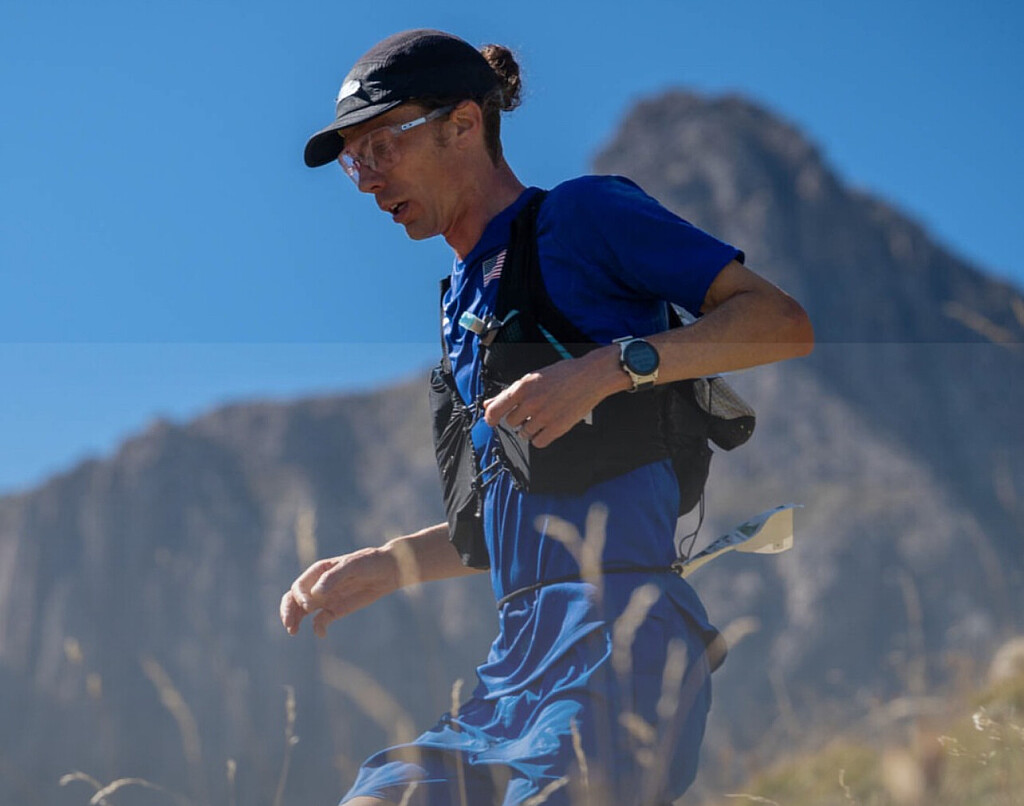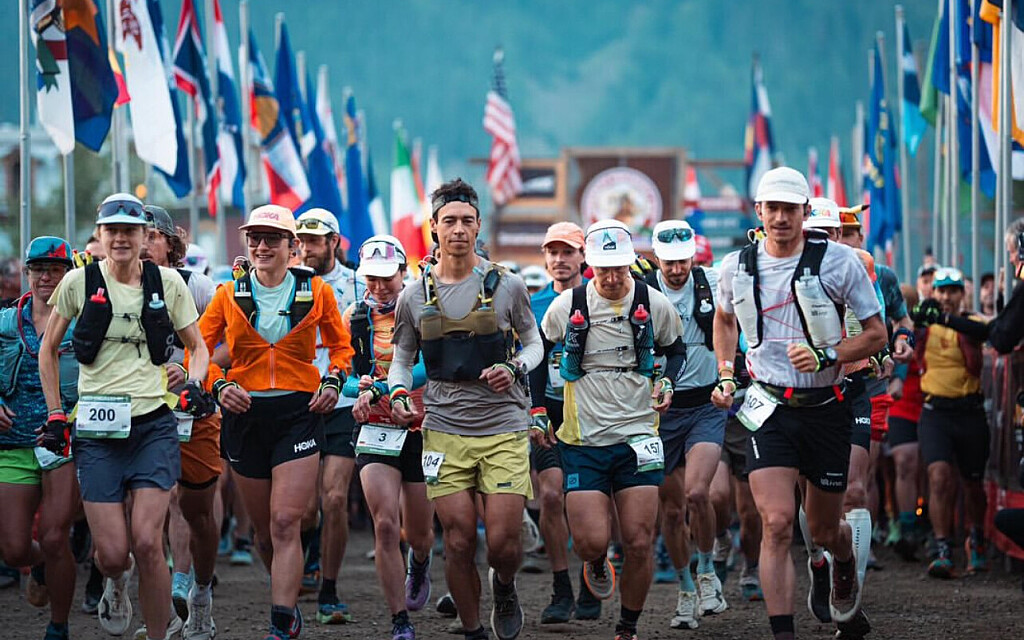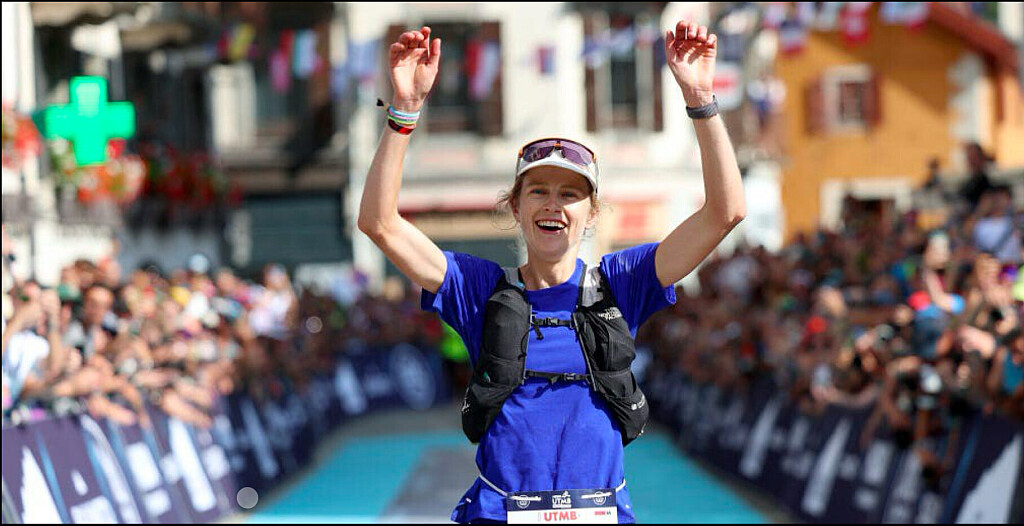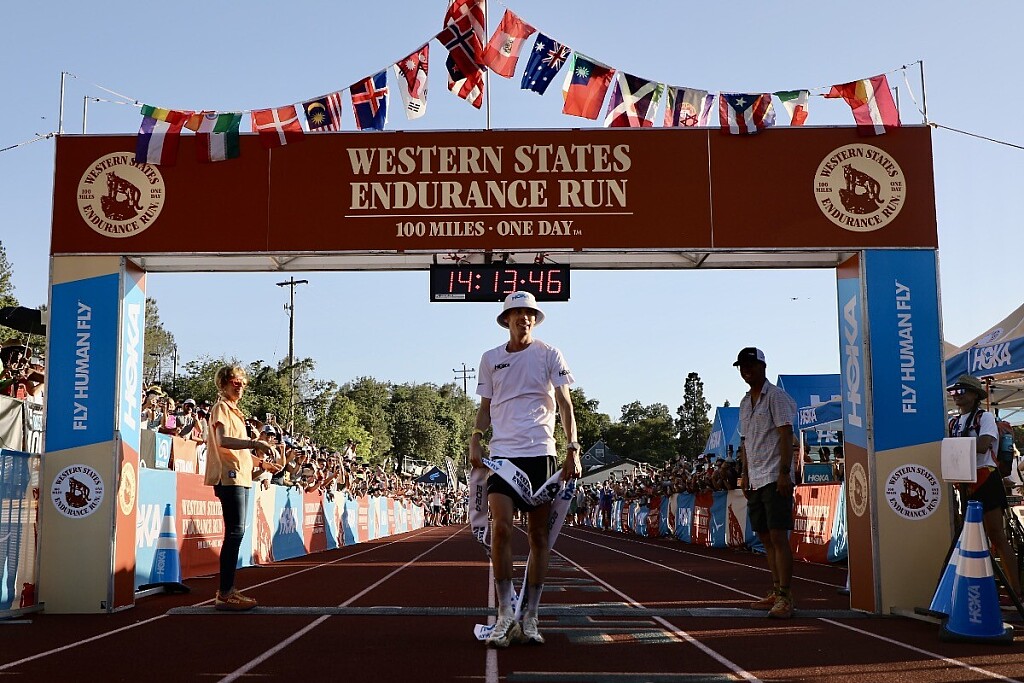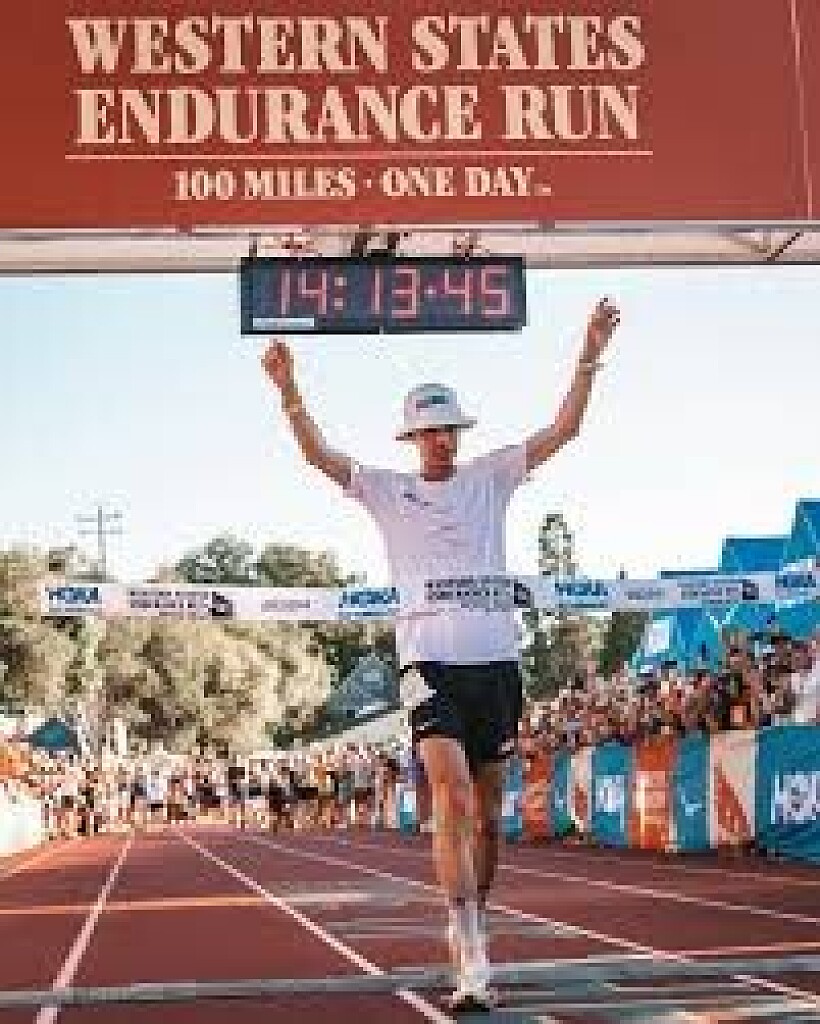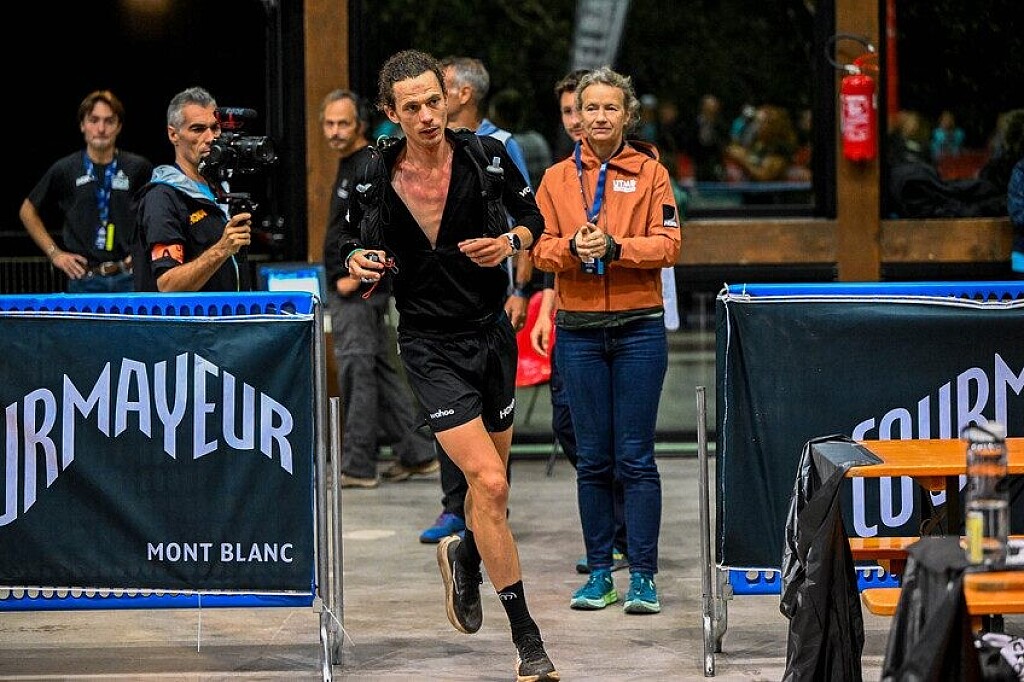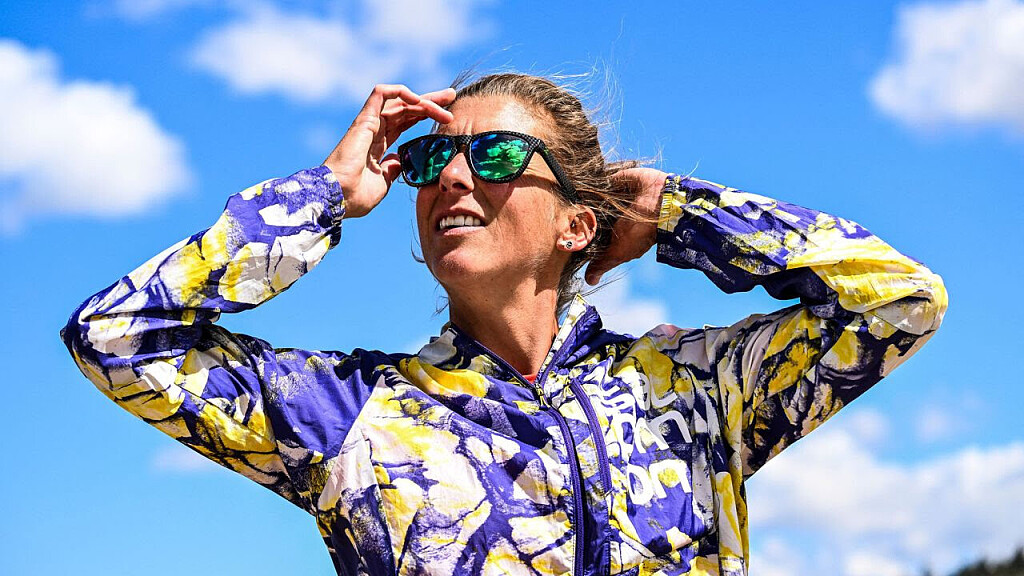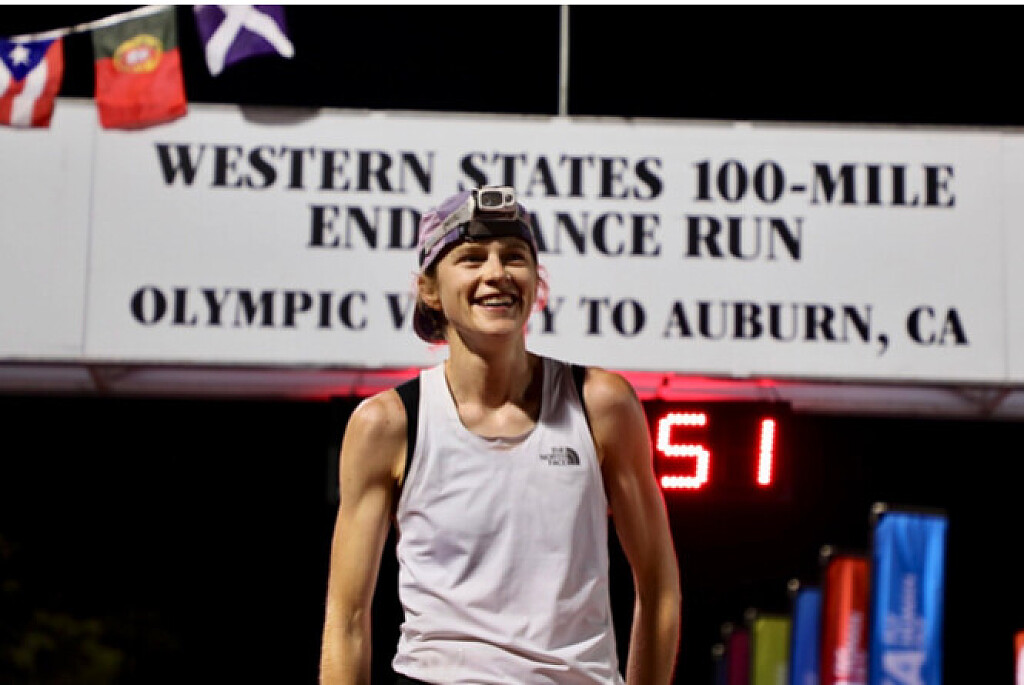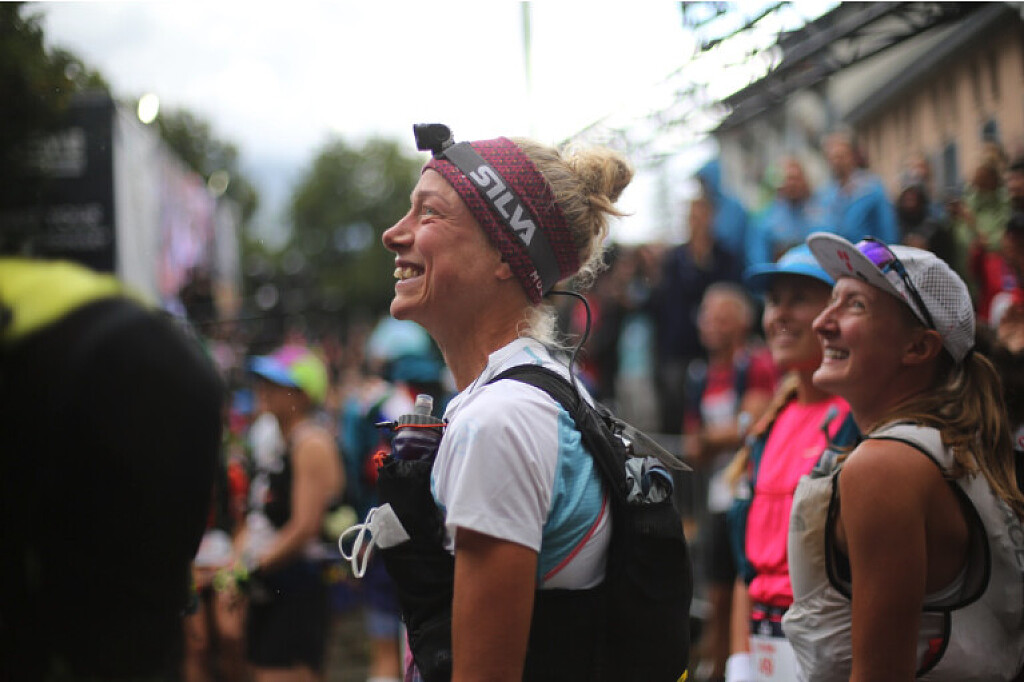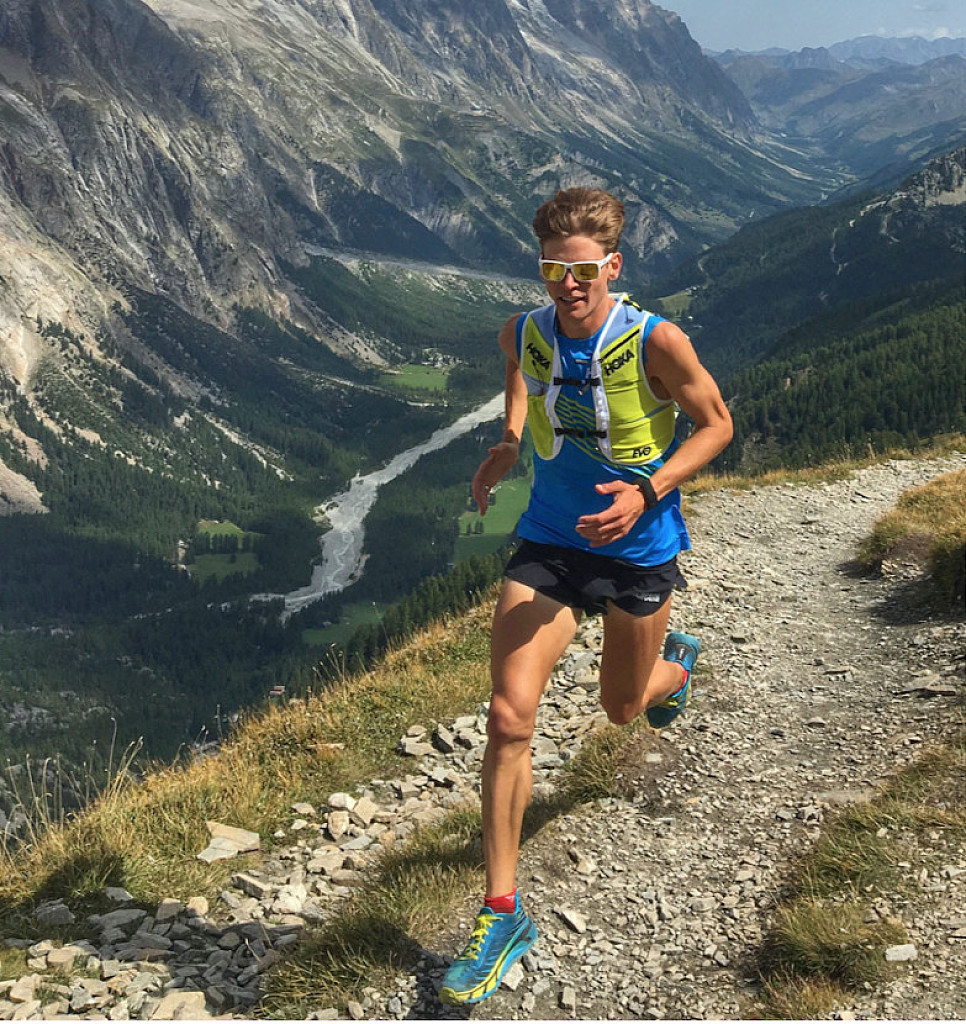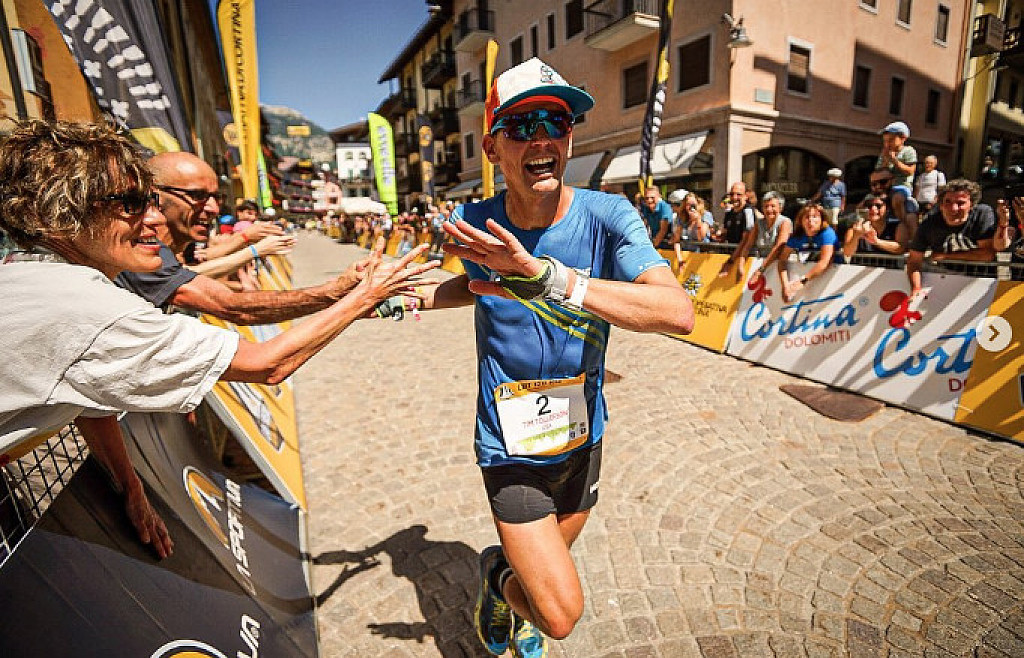Running News Daily
Running News Daily is edited by Bob Anderson. Send your news items to bob@mybestruns.com Advertising opportunities available. Train the Kenyan Way at KATA Kenya and Portugal owned and operated by Bob Anderson. Be sure to catch our movie A Long Run the movie KATA Running Camps and KATA Potato Farms - 31 now open in Kenya! https://kata.ke/
Index to Daily Posts · Sign Up For Updates · Run The World Feed
Articles tagged #Katie Schide
Today's Running News
Americans Jim Walmsley and Katie Schide Win Trail Running World Championship Titles
Canfranc, Spain — September 27, 2025. It was a historic day for U.S. trail running in the Pyrenees as Jim Walmsley and Katie Schide stormed to victory in the Long Trail race at the 2025 World Mountain and Trail Running Championships. Both dominated the grueling 50.9-mile course that packed in nearly 17,750 feet of elevation gain and loss across technical, mountainous terrain.
Walmsley’s Men’s Triumph
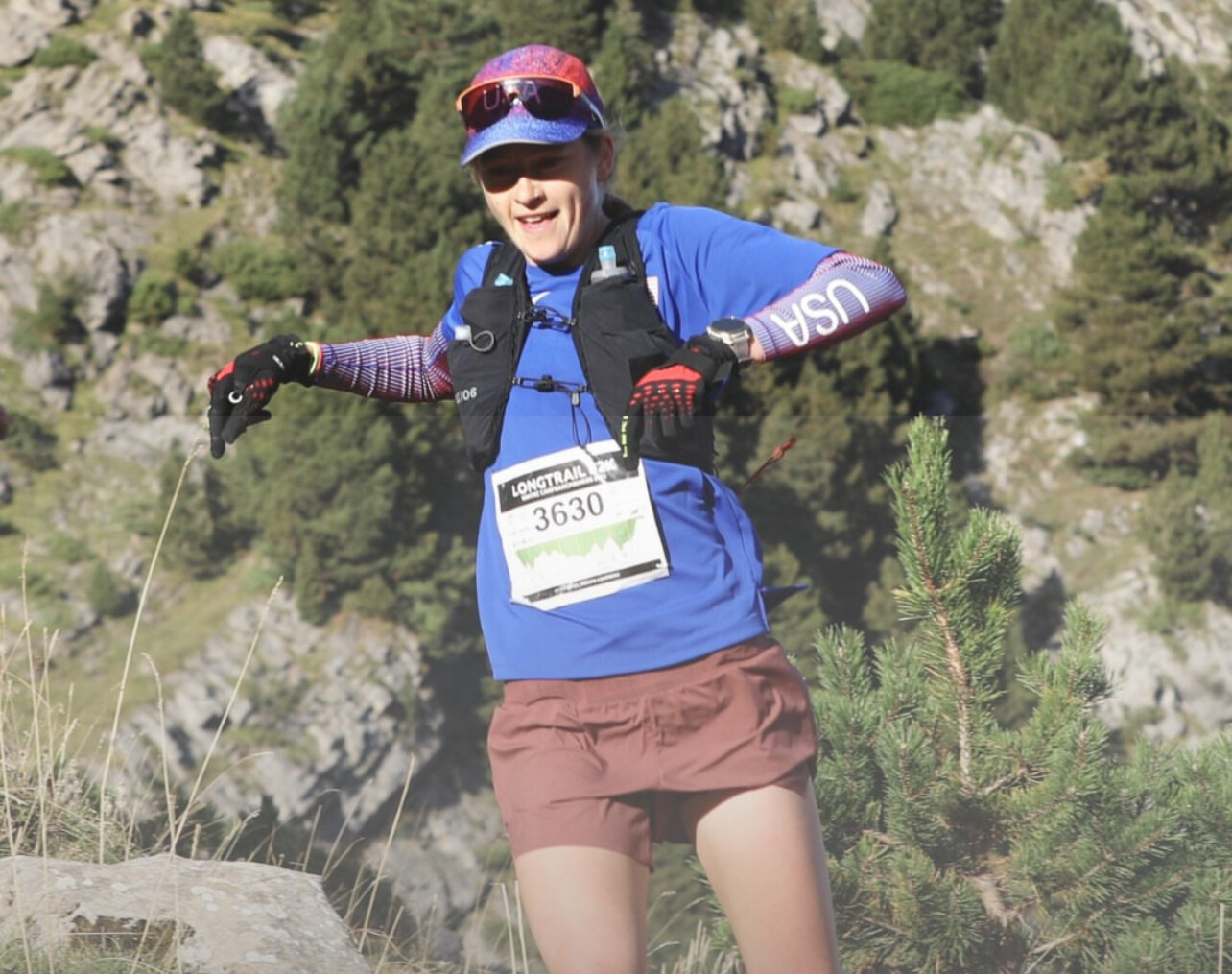
Walmsley, already celebrated as one of the best ultra runners of his generation, played his cards perfectly. After running with France’s Benjamin Roubiol and Louison Coiffet through the opening stages, he surged clear just past 47 km. By the 70 km mark he had carved out a commanding lead and never looked back.
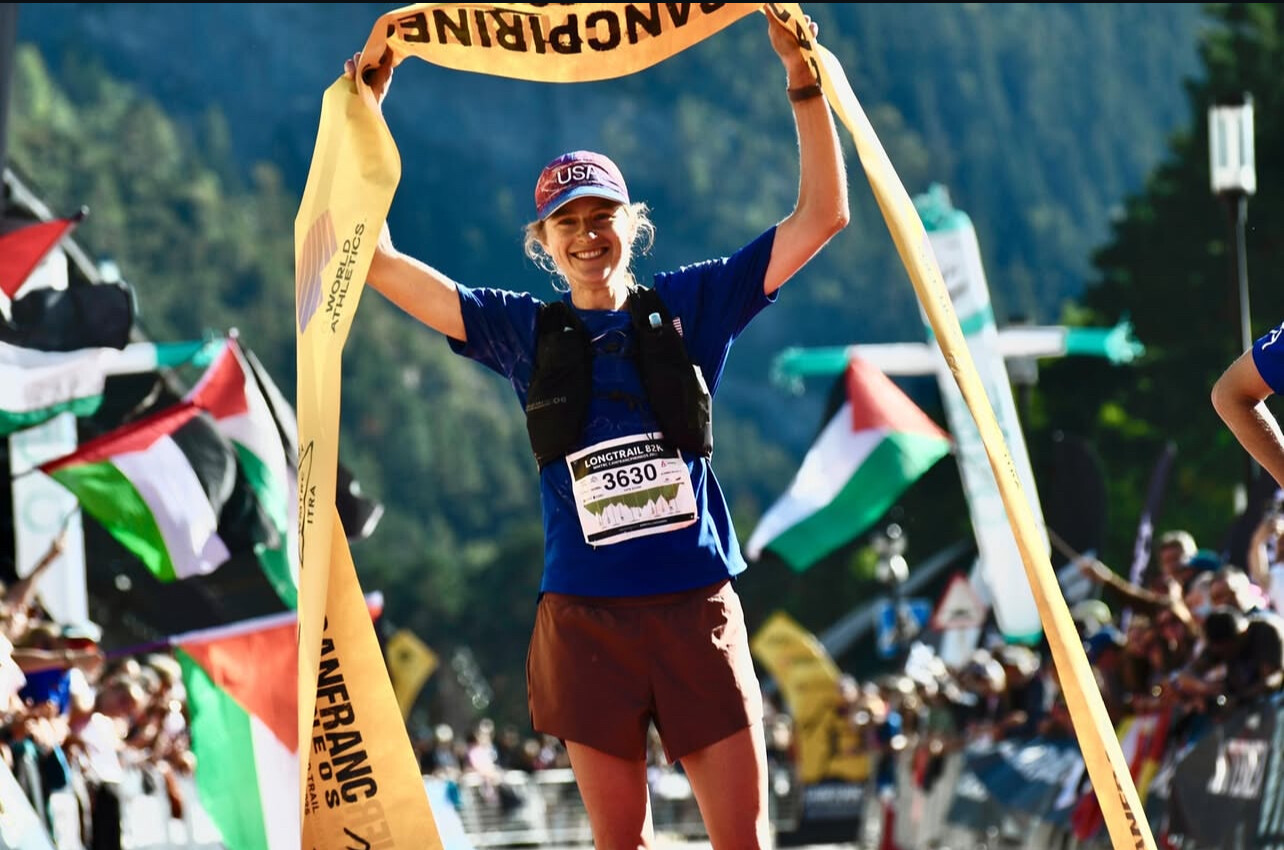
He broke the tape in 8:35:11, more than ten minutes ahead of Roubiol and Coiffet, who shared silver in 8:46:05. For Walmsley, who became the first American man to win UTMB in 2023, this victory further cements his legacy as the standard-bearer for U.S. trail and ultra running.
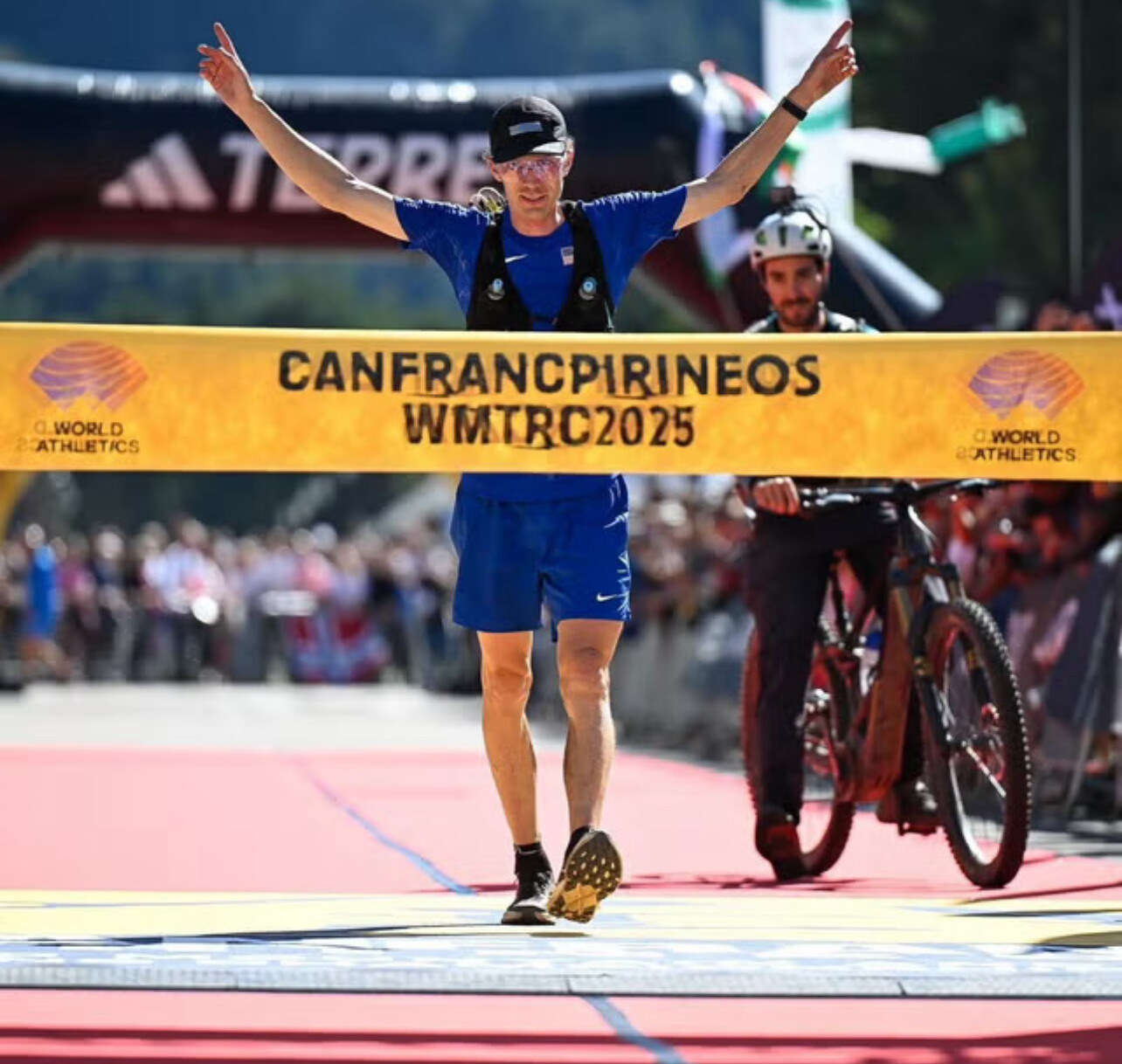
Schide’s Commanding Performance
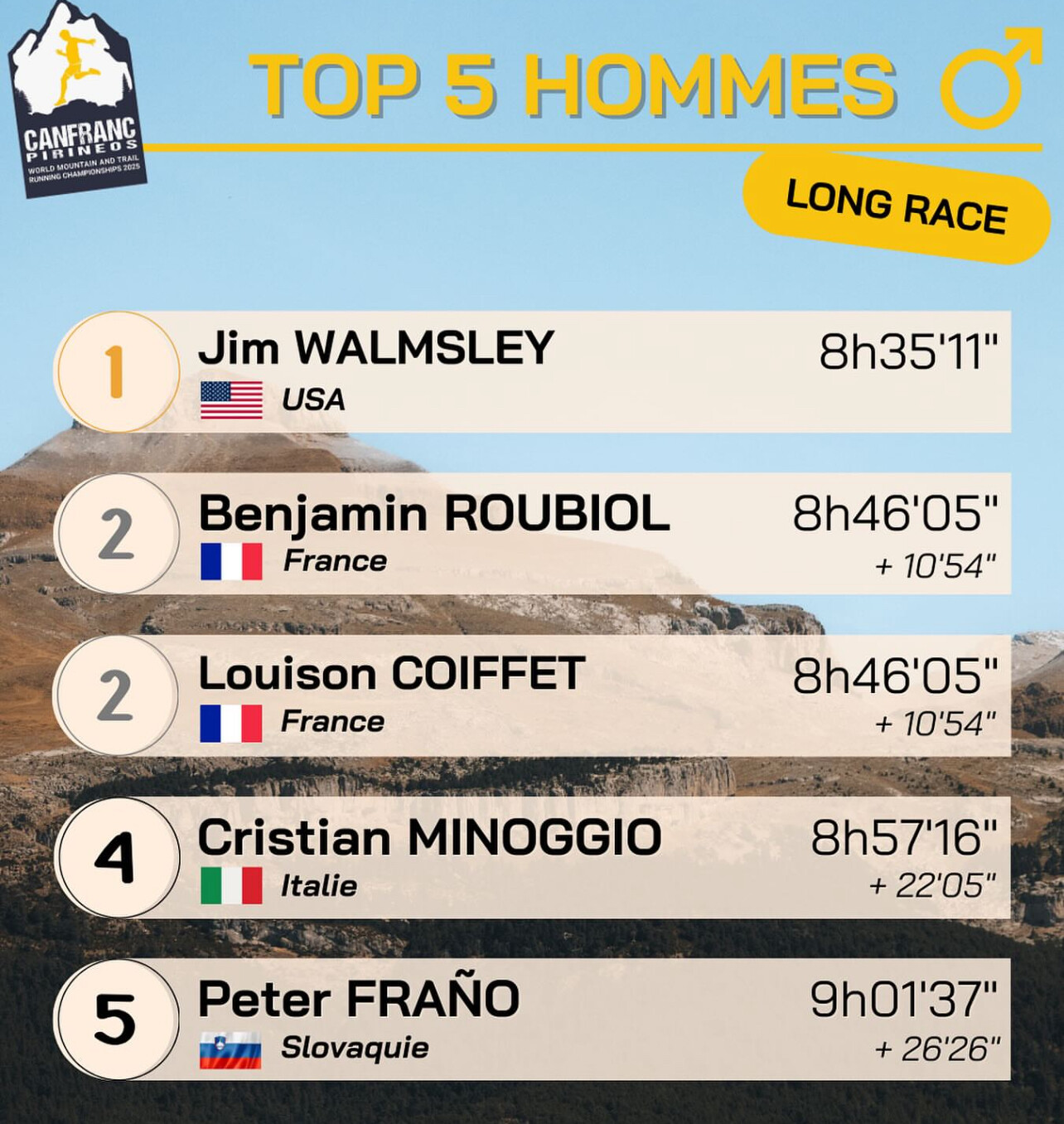
On the women’s side, Katie Schide delivered a masterclass in front-running. She built a gap of 38 seconds within the first 4 km, stretched it to five minutes by 25 km, and by the halfway point was nearly 20 minutes ahead of her nearest rival.
Schide crossed the finish in 9:57:59, winning by more than 25 minutes. Already a champion of UTMB, Hardrock, and Western States, her latest triumph adds a world title to a résumé that ranks among the most impressive in the sport.
A Landmark for U.S. Trail Running
Together, Walmsley and Schide showcased American dominance on one of the world’s toughest stages. Their wins highlight not only physical endurance and technical skill but also tactical brilliance and unwavering mental strength.
For fans and fellow athletes alike, their victories in the Pyrenees are a reminder of what’s possible when preparation meets opportunity on the world stage.
by Boris Baron
Login to leave a comment
Ludo Pommeret and Katie Schide Dominate a Gritty 2025 Hardrock 100
The 2025 Hardrock 100 delivered everything the ultra-trail world expects from one of the sport’s most iconic races—grit, altitude, heartbreak, and triumph. At the heart of it all, France’s Ludovic “Ludo” Pommeret successfully defended his title, while American ultra star Katie Schide shattered the women’s course record.
Pommeret Goes Back-to-Back
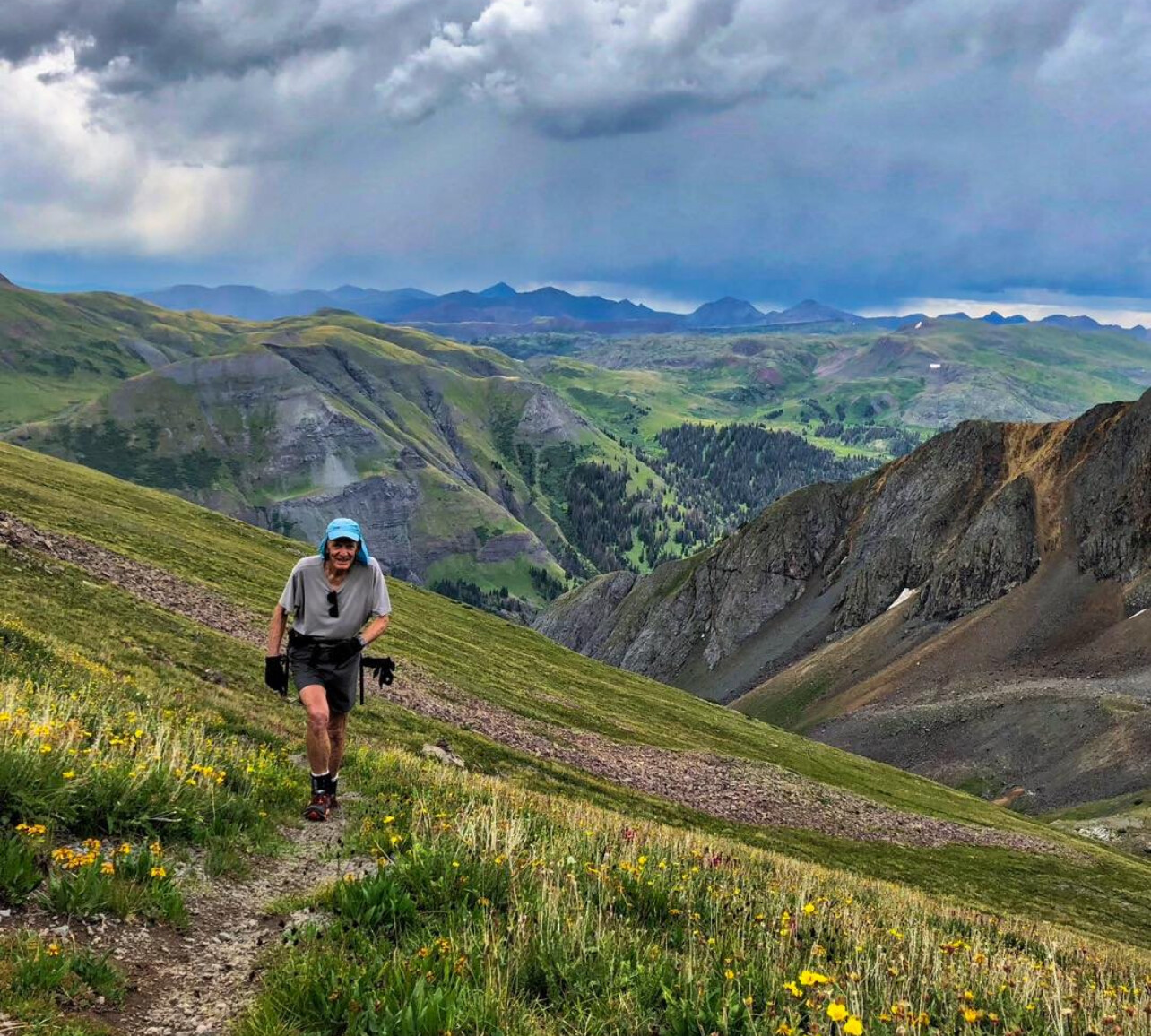
For the second year in a row, the 49-year-old Pommeret conquered the brutal 102.5-mile loop through Colorado’s San Juan Mountains, finishing in 22:21:55—the fifth-fastest time in race history. Battling thin air, smoky conditions from nearby wildfires, and rugged terrain with over 33,000 feet of elevation gain, Pommeret executed a masterclass in pacing.
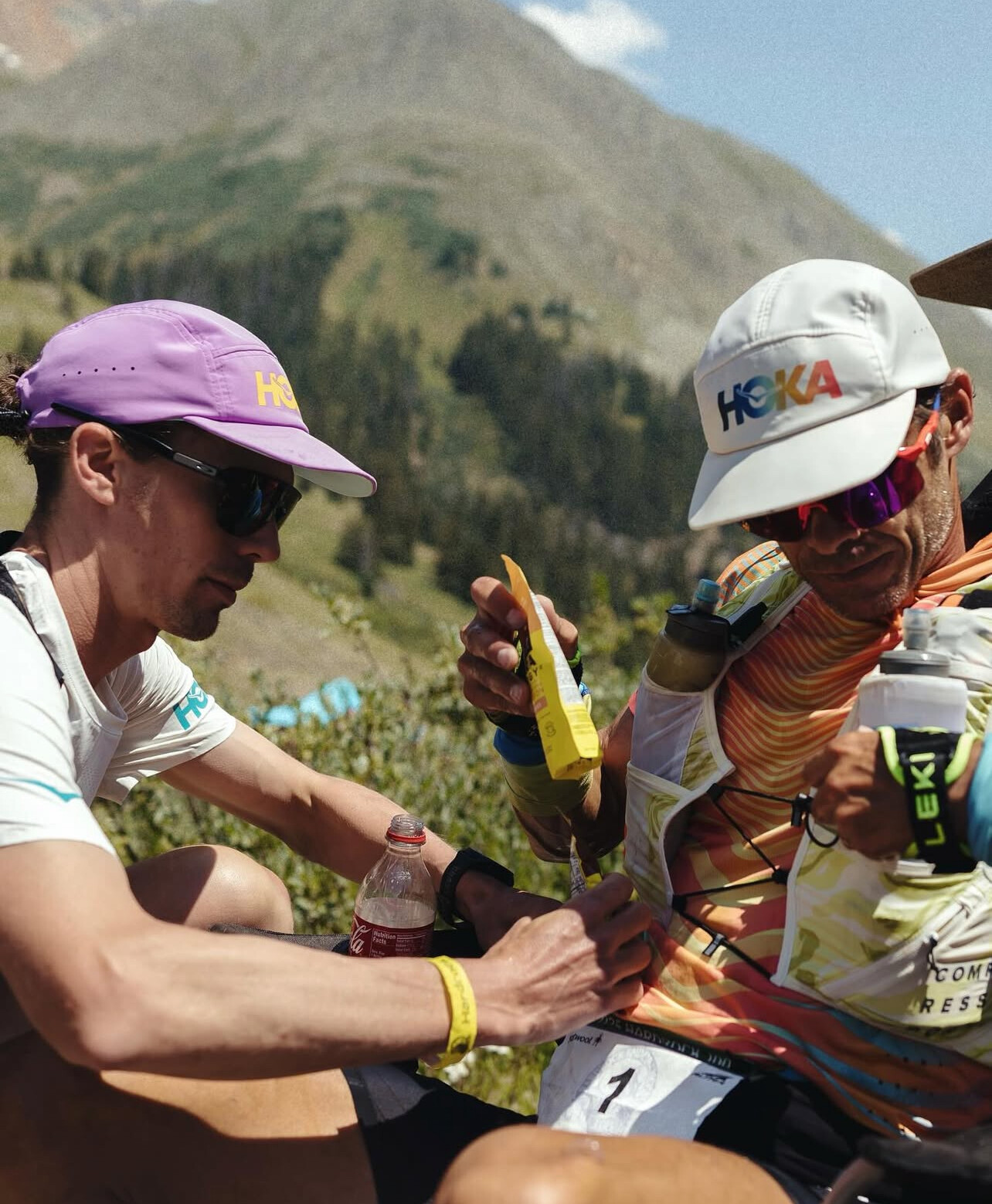
Starting conservatively on the climbs, he surged on the descents, aided by elite pacers Jim Walmsleyand Vincent Bouillard. By dawn, he had extended his lead and cruised into Silverton well under the 48-hour cutoff, earning another coveted kiss of the Hardrock finish-line rock.
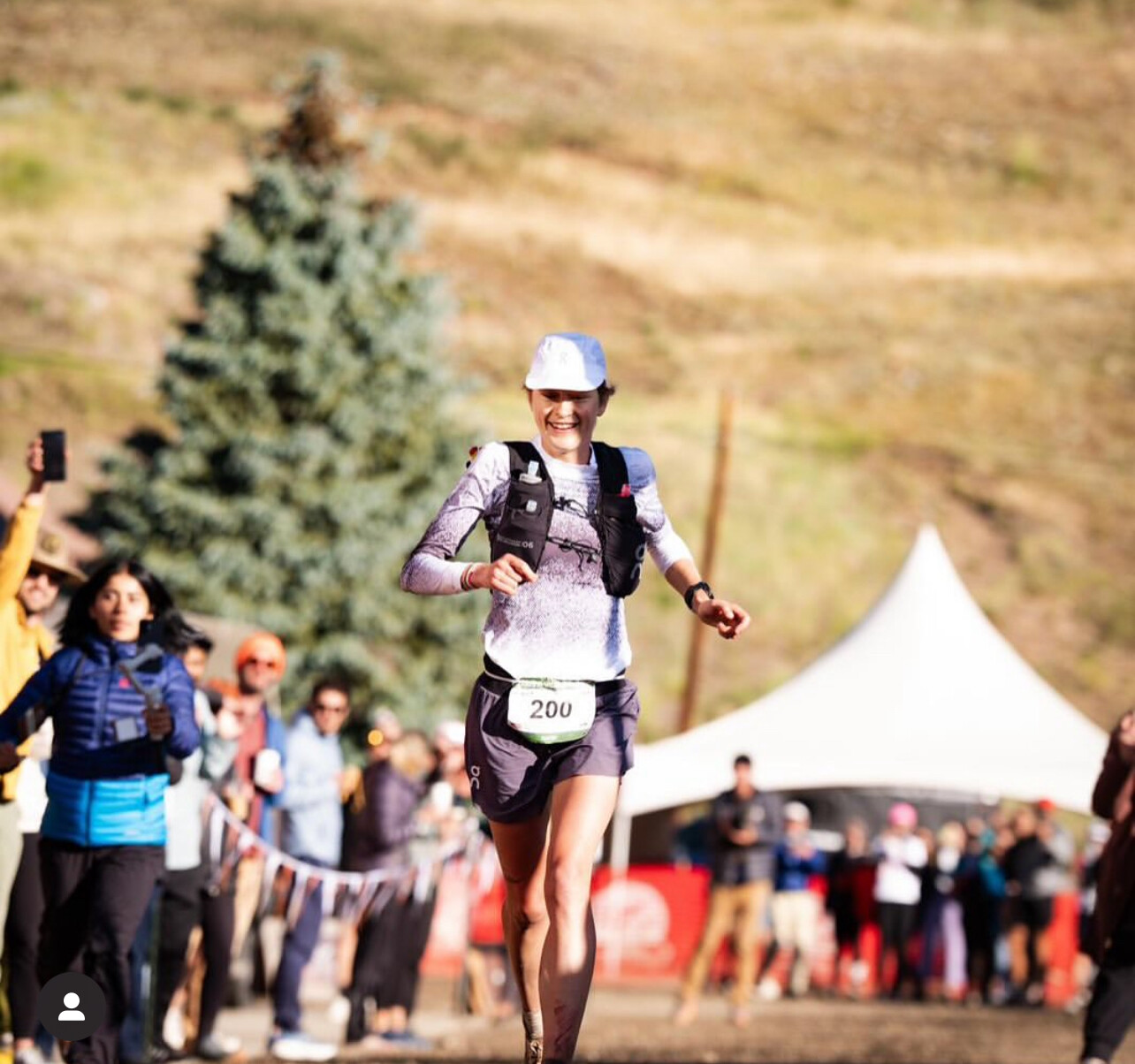
The men’s podium was a French sweep: Mathieu Blanchard placed second in 23:44, followed by Germain Grangier in 24:04.
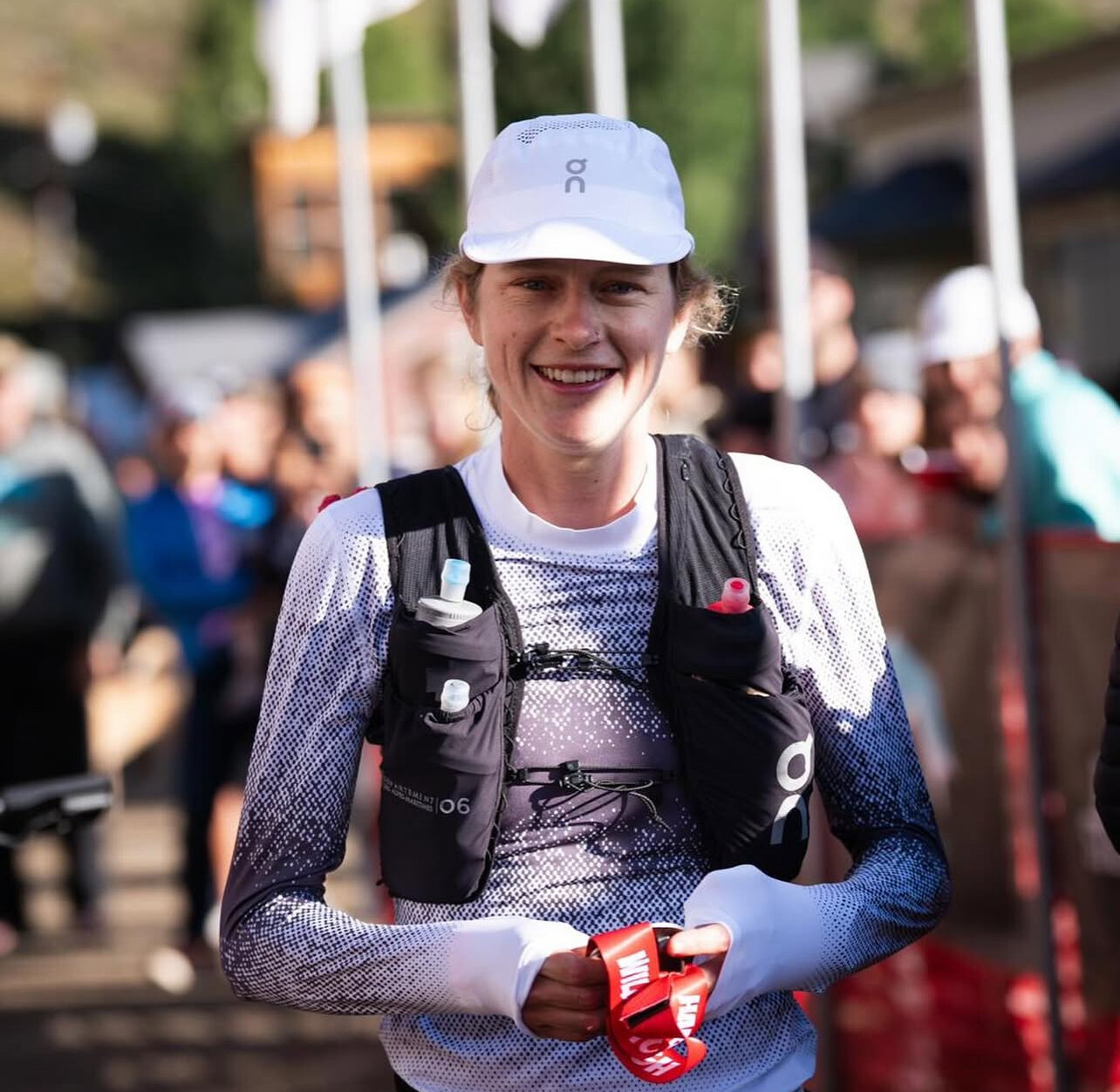
“I was worried about the smoke early on,” Pommeret said afterward, “but the final miles were magic. I even walked the last climb to take it all in.”
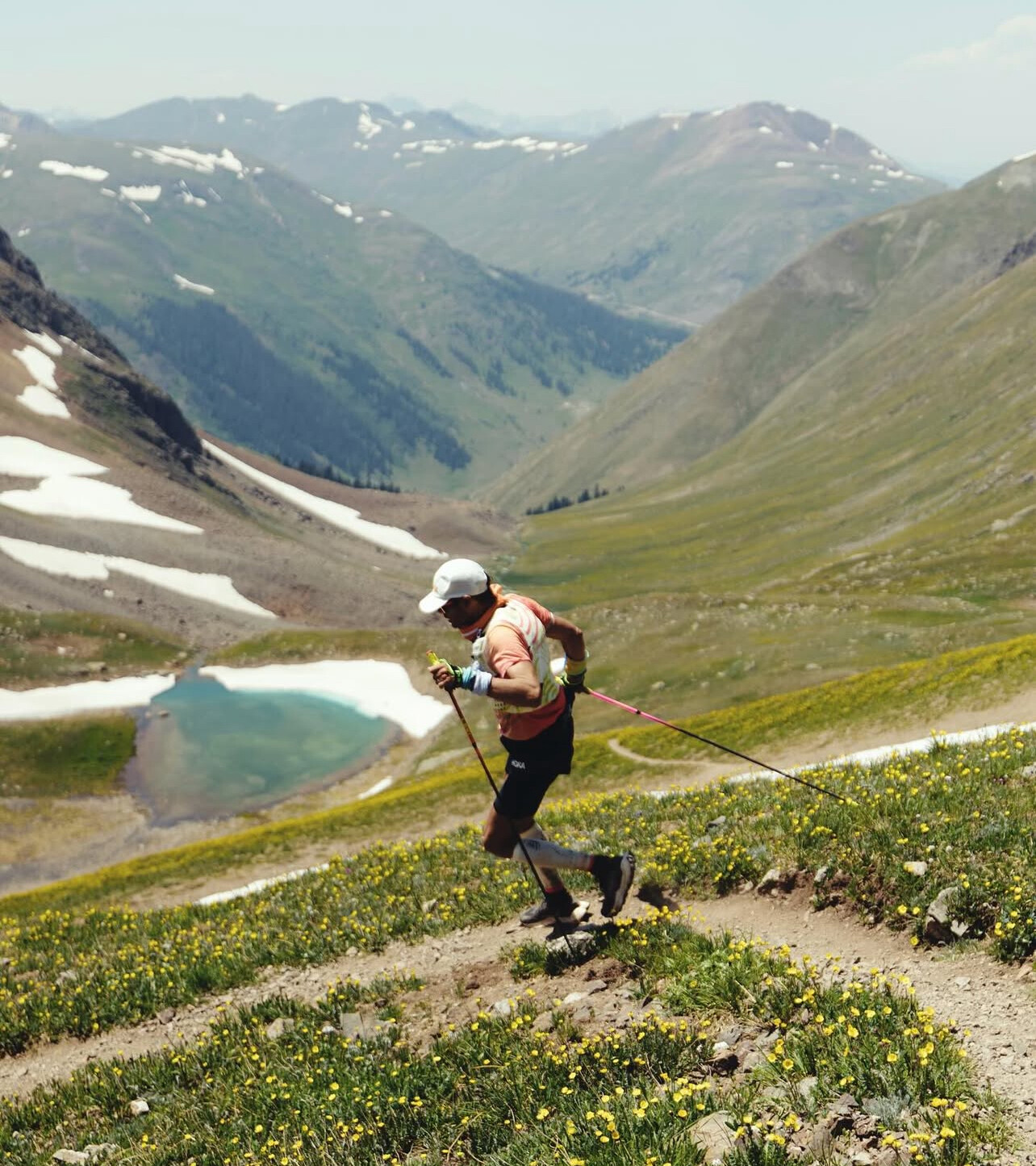
Schide Smashes Course Record
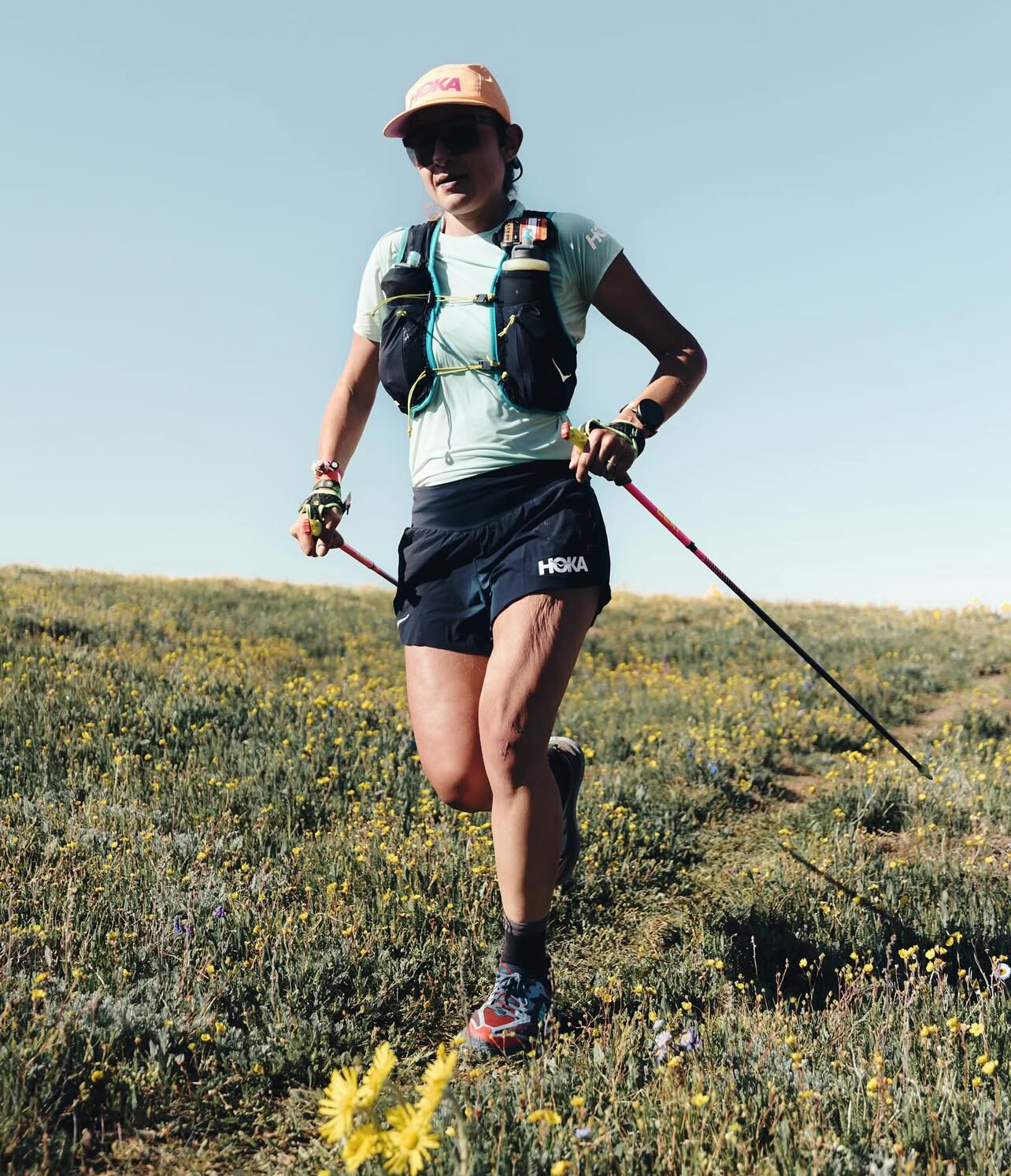
In the women’s race, Katie Schide delivered one of the most commanding performances in Hardrock history, crossing the finish in 25:50—the fastest counterclockwise time ever on this course. Her effort redefined what’s possible on one of the toughest 100-milers in the world, solidifying her place among the sport’s elite.
A Somber Note
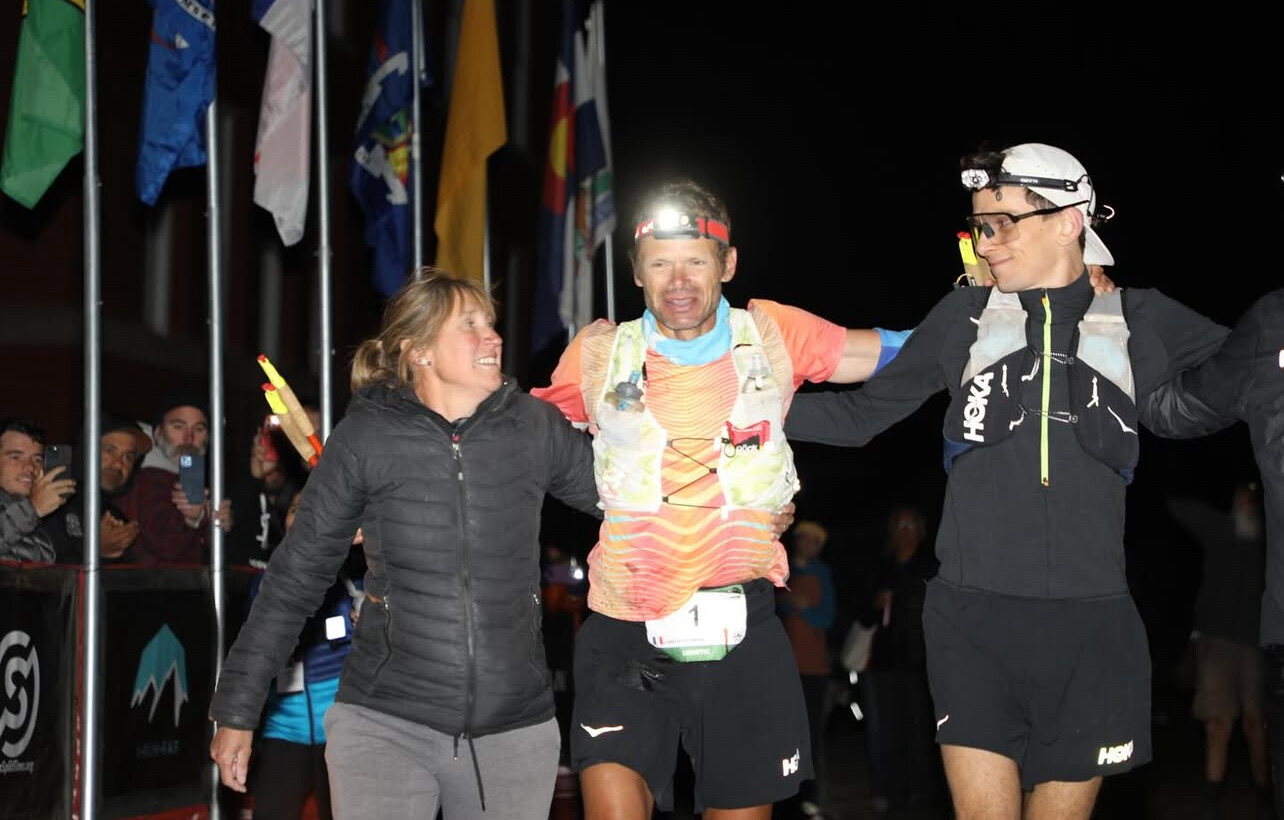
The celebration was tempered by tragedy. One of the 146 starters, 60-year-old Elaine Stypula, passed away early in the race. The trail community paused to honor her memory, a reminder of both the beauty and the inherent risk of this extreme pursuit.
Why This Race Matters
• Age is just a number: At nearly 50, Pommeret continues to perform at the highest level, adding another major title to a résumé that includes victories at UTMB (2016) and Diagonale des Fous (2021).
• Trail’s toughest test: With extreme elevation, altitude averaging over 11,000 feet, and no room for error, Hardrock remains a crucible for the toughest athletes on Earth.
• Global competition: With a French men’s podium and an American record-breaker, the international caliber of this year’s race underscored its global significance.
2025 Hardrock 100 Key Results
|
Category |
Winner |
Time |
|
Men’s Champion |
Ludovic Pommeret |
22:21:55 |
|
Women’s Champion |
Katie Schide |
25:50 (course record) |
|
Men’s 2nd |
Mathieu Blanchard |
23:44 |
|
Men’s 3rd |
Germain Grangier |
24:04 |
|
|
|
|
With record-breaking performances and powerful moments of perseverance, the 2025 Hardrock 100 once again proved why it’s one of the most respected races in the world of ultrarunning.
by Boris Baron
Login to leave a comment
Hardrock 100
100-mile run with 33,050 feet of climb and 33,050 feet of descent for a total elevation change of 66,100 feet with an average elevation of 11,186 feet - low point 7,680 feet (Ouray) and high point 14,048 feet (Handies Peak). The run starts and ends in Silverton, Colorado and travels through the towns of Telluride, Ouray, and the ghost town...
more...American Katie Schide Shatters Courtney Dauwalter’s Course Record to Win UTMB
She’s now the third woman to win both Western States and UTMB in the same year.
Katie Schide is on a tear.
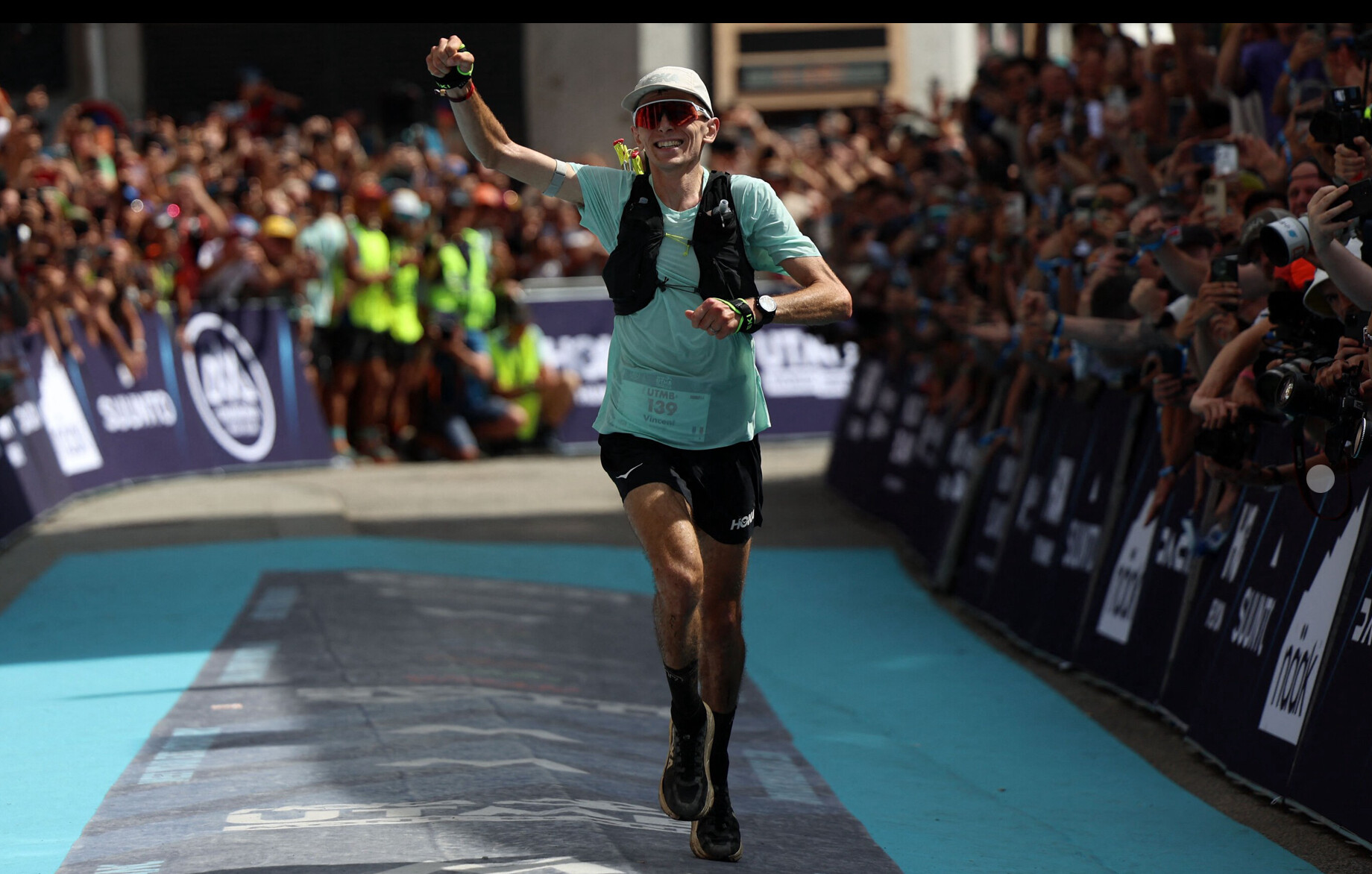
On Saturday, the American won the women’s race at the Ultra-Trail du Mont-Blanc (UTMB) in dominant fashion, finishing the 109-mile race in 22 hours, 9 minutes, and 31 seconds. Her time is 21 minutes faster than Courtney Dauwalter’s course record of 22:30:54 from 2021.
Schide, 32, is undefeated this year, winning the Canyons 100K in April and the prestigious Western States 100 in June.
Ruth Croft of New Zealand was 39 minutes behind Schide in second place (22:48:37). She passed Canada’s Marianne Hogan—who would finish third in 23:11:15—just after the 100-mile mark. Dauwalter, who won the Hardrock 100 on July 12, did not compete in this year’s edition.
In the men’s race, Vincent Bouillard of France was not favored to win, but he ultimately took the crown. He went to the lead after 48 miles and never relinquished it, crossing the finish line in Chamonix in 19:54:23. His compatriot, Baptiste Chassagne, was next to finish in 20:22:45, while Ecuador’s Joaquin Lopez placed third (20:26:22).
Last year’s champion, Jim Walmsley of the U.S., withdrew just after 50 miles because of a knee issue, according to a post on his Instagram story. He remains the only American man to win the race.
UTMB has been contested since 2003. The course—which slightly changes year-to-year—starts and ends in the French Alpine town of Chamonix and traverses through Italy and Switzerland along the way, covering over 30,000 feet of elevation gain.
This is Schide’s second time winning the event after taking top honors in 2022. Originally from Maine, Schide now trains in France and is sponsored by The North Face.
In the final 7 kilometers, a downhill section, she was over 20 minutes ahead of course record pace, but she started limping. The buffer, however, was enough, and by the end, the hitch in her stride had mostly dissipated.
Schide said in a post race interview on the UTMB broadcast that her main goal was to dip under the 22-hour barrier, followed by a secondary goal breaking Dauwalter’s time from 2021. Schide went out hard in the first half—like she did in 2022—but she said winning two years ago gave her some much-needed context.
“I think this race, I just went in more confident in myself and I wasn’t surprised that I was fast,” she said. “Whereas in 2022, I was kind of freaking out because I was like “Oh, I didn’t really mean to do that.’ But this time, I meant to do it, and I was just focused on trying not to die too hard at the end.”
Schide now joins Dauwalter (2023) and Nikki Kimball (2007) as the third woman to win both Western States and UTMB in the same year.
Login to leave a comment
Western States 100: Walmsley Wins a Fourth Time While Schide Rocks the Women’s Field
For hours, Katie Schide (pre-race and post-race interviews) chased ghosts. For hours, Jim Walmsley (pre-race and post-race interviews) and Rod Farvard (post-race interview) chased each other. And in the end, after 100 courageous, gutsy miles at one of the world’s most iconic ultramarathons, it was Schide and Walmsley who won a fast, dramatic 2024 Western States 100.
Schide, an American who lives in France, was on pace to break the course record until late in the race, while Americans Walmsley and Farvard battled throughout most of the second half of the race, alternating the lead as late as mile 85.
Schide’s winning time was 15:46:57, just over 17 minutes behind Courtney Dauwalter’s 2023 course record, almost an hour faster than her own time last year, and the second fastest women’s time ever. Walmsley, meanwhile, won his fourth Western States in 14:13:45, the second fastest time ever — only behind his own record of 14:09:28 that he set in 2019.
Second and third in the men’s race came down to an epic sprint finish on the track between Farvard and Hayden Hawks (pre-race and post-race interviews), who finished in 14:24:15 and 14:24:31, respectively.
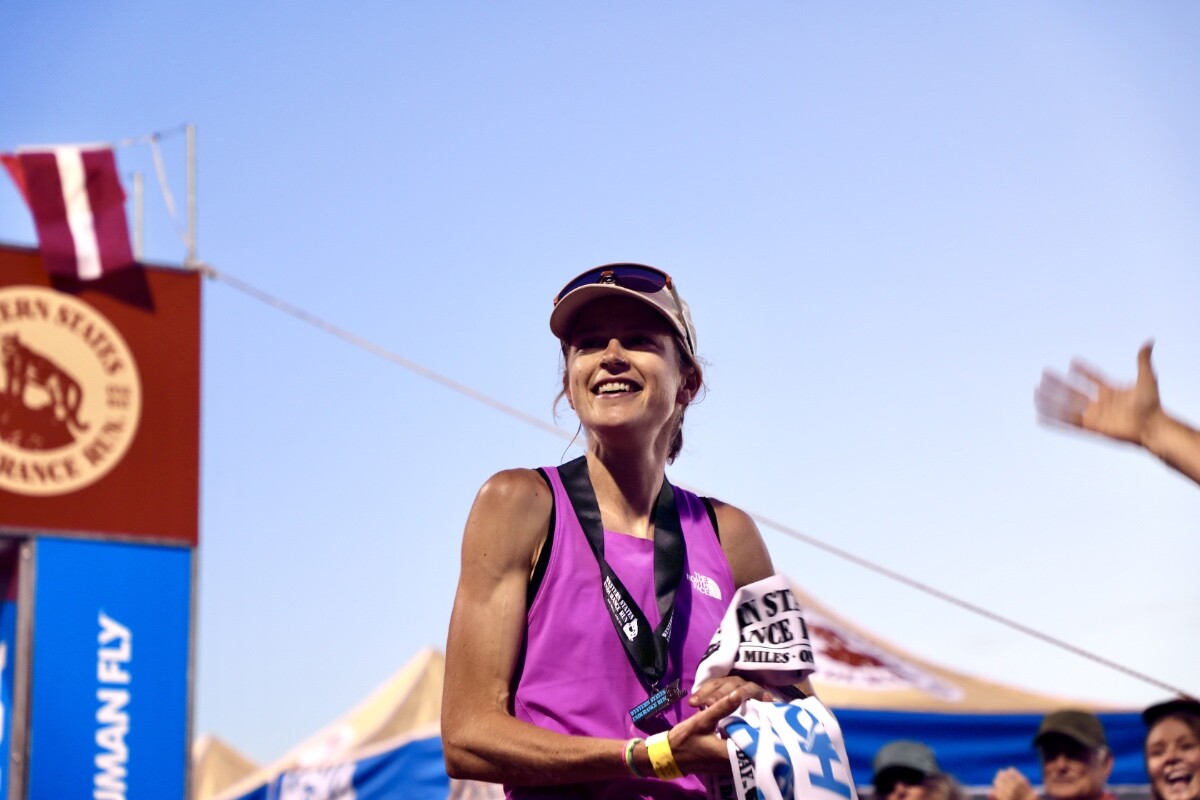
In the women’s race for the podium, Fu-Zhao Xiang (pre-race and post-race interviews) finished second in 16:20:03, and Eszter Csillag (pre-race and post-race interviews) took third for the second time in a row, in 16:42:17.
Both races featured one of the deepest and most competitive fields in race history, with the men’s top five all coming in faster than last year’s winning time, and the women’s top 10 finishing just under 40 minutes faster than last year’s incredibly competitive top 10.
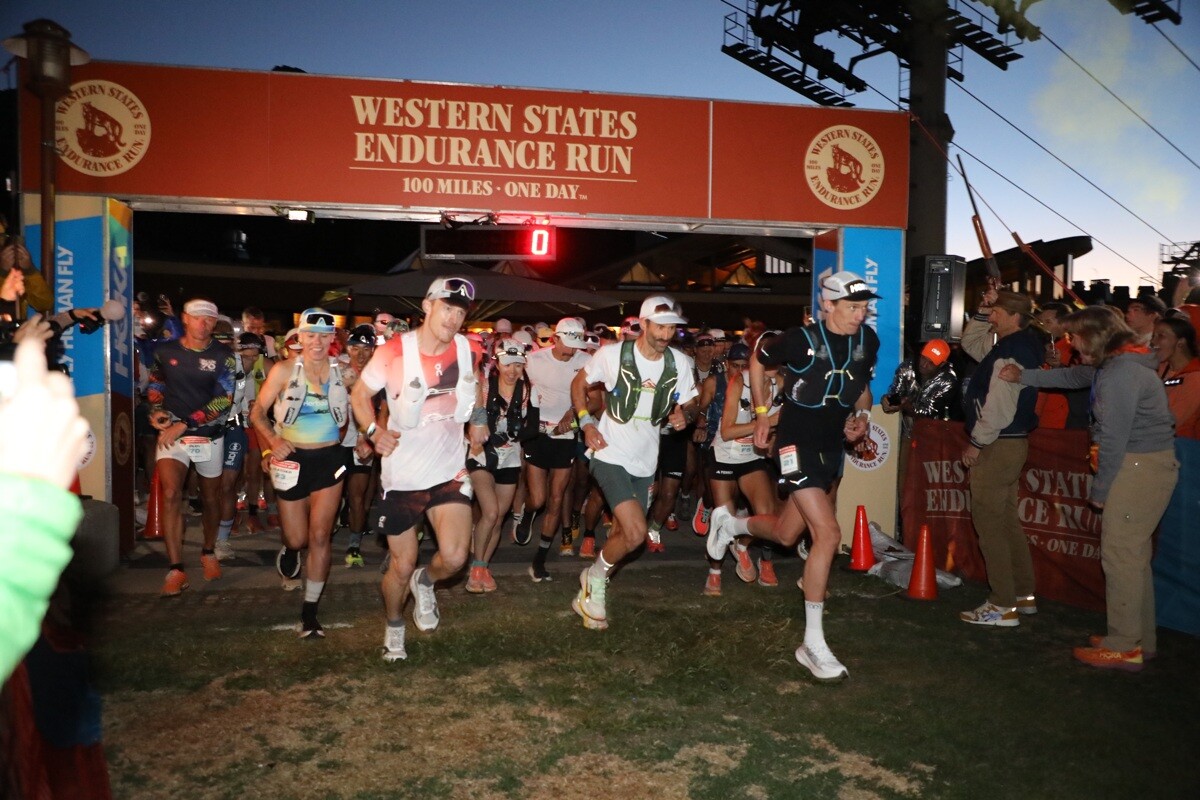
At 5 a.m. on Saturday, June 29, they were all among the 375 runners who began the historic route from Olympic Valley to Auburn, California, traversing 100.2 miles of trail with 18,000 feet of elevation gain and 22,000 feet of loss. After last year’s cool temperatures, the weather at this year’s race was a bit warmer, albeit with a notable lack of snow in the high country. The high temperature in Auburn was in the low 90s Fahrenheit.
A special thanks to HOKA for making our coverage of the Western States 100 possible!
2024 Western States 100 Men’s Race
In his return to the race that propelled him to the heights of global trail running and his first ultra on American soil in three years, Jim Walmsley (pre-race interview) demonstrated why he is, once again, the king of Western States. Before the race, Walmsley exuded a calmness that perhaps eluded him during his first attempts, when he attacked it with an obsessive intensity that led him to famously take a wrong turn and then dropping out in back-to-back years.
“We’ll just roll with what plays out and just kind of see what happens in the race,” he said in his pre-race interview. There’s a marked difference when compared to his remarks from his interview before the 2016 race.
What happened in the race was this: In his fourth Western States, Rod Farvard (post-race interview) had the race of his life to push Walmsley like he’d never been pushed before in his long history with the event.
Farvard — a 28-year-old from Mammoth Lakes, California, who has improved his finish each year at the race, from a DNF in 2021 to 41st place in 2022 to 11th place last year — put himself in a strong position from the start, leading a large pack of runners that included Walmsley at the top of the Escarpment, the 2,500-foot climb in the first four miles of the race. For the next 45-plus miles, Farvard remained in the top 10, part of a chase pack of American Hayden Hawks (pre-race and post-race interviews), Kiwi Dan Jones (pre-race interview), and Chinese runner Guo-Min Deng, among others.
At the Robinson Flat aid station at mile 30 — the symbolic end of the runners’ time in the high country, which features an average elevation of around 7,000 feet — Walmsley, who started the race conspicuously wearing all black, came through in 4:24 looking fast and smooth, now wearing an ice-soaked white shirt. Jones, the 2024 Tarawera 102k champion and fifth-place finisher in his Western States debut last year, and Hawks, who set the course record at February’s Black Canyons 100k after dropping out of last year’s Western States, followed about 90 seconds later. The two runners, frequent training partners, ran together frequently throughout the day, with Hawks often foregoing ice at aid stations.
After the trio of Walmsley, Hawks, and Jones went through Last Chance at mile 43 together, Walmsley put nearly two minutes on them up the climb to Devil’s Thumb. “I was with everybody at the bottom,” he said, according to the race’s official livestream.
About halfway through, at mile 49.5, the order remained the same: Walmsley in the lead with an elapsed time of 6:58, followed by Jones one minute back, Hawks two minutes back, and Farvard just over two and a half minutes back. The rest of the top 10 were last year’s 17th-place finisher Dakota Jones; 2024 Transvulcania Ultramarathon champion Jon Albon (pre-race interview), who is from the U.K. but lives in Norway; 2023 fourth-place finisher Jia-Sheng Shen (China) (pre-race interview); 2023 Canyons 100k champion Cole Watson; Western States specialist Tyler Green (pre-race interview); and Jupiter Carera (Mexico).
Then began a thrilling, chaotic second half of the race — featuring a gripping back-and-forth between Walmsley and Farvard, a wildfire near the course, a two-man river crossing, and a sprint finish on the track.
It all started when Walmsley entered Michigan Bluff at mile 55, again looking calm and in control, changing shirts and getting doused with ice. Farvard came in just behind him and left the aid station first, leading the race for the first time since the first climb up the Escarpment. The same routine took place seven miles later at Foresthill: Walmsley entering first, Farvard leaving first.
For the next 18 miles, the two runners alternated in the lead. By mile 78, they were so close that they were crossing the American River at the same time. Their battle underscored the overall depth of the field at this year’s race: At mile 80, the top five men were within 16 minutes of one another.
Around then, the 15-acre Creek Fire, which started not long before, was visible from the final quarter of the course and crews were temporarily not permitted to travel to the Green Gate aid station at mile 80 because the route to it passed close to the fire. Eventually, a reroute was established for crews to get to Green Gate and, later, after the wildfire was controlled, the regular route was reopened.
At Green Gate, Farvard came through in the lead, with Walmsley four minutes back and looking like he was hurting. It was then, perhaps, that the thought entered people’s minds: Could Farvard really take down the champ?
But Jim Walmsley is Jim Walmsley for a reason, and he again proved why he is among the world’s best. Against the ropes, facing one of his first real challenges in the race that shaped him, he delivered, entering the next aid station, Auburn Lake Trails at mile 85, more than a minute earlier than Farvard. He had made up five minutes in five miles.
Walmsley never trailed again, increasing his lead to 11 minutes by the Pointed Rocks aid station at mile 94 and then picking up his crew, including his wife, Jess Brazeau, at Robie Point to run the final mile with him. He entered the track at Placer High School to loud cheers, his loping stride still looking smooth, stopping a few steps short of the tape to wave to the crowd and raise his arms in triumph. He had done it again.
Behind him, Farvard was fading but determined to cap an extraordinary race with a second-place finish. Hawks, who had made up five minutes on Farvard in the couple miles between Pointed Rocks and Robie Point, was on the hunt, and by the time he stepped on the track, Farvard was within sight.
It was then that fans were treated to one of the most unique sights in all of ultrarunning: After 100 miles of racing, two men were sprinting against each other on a track. In the end, Farvard’s lead held, and he finished 16 seconds ahead of Hawks. He collapsed at the finish line — a fitting end to an epic performance.
Dan Jones ended a strong race with a fourth-place finish in 14:32:29, with Caleb Olson capping an impressive second half of the race — from 11th at mile 53 to fifth in 14:40:12 at the finish. All five men ran a time that would have won the race last year.
Behind Olson came Jon Albon, running 14:57:01 in his 100-mile running-race debut, followed by the surgical Tyler Green, who finished in seventh for his fourth straight top 10 finish at the race. Green’s time of 15:05:39 also marked a new men’s masters course record, breaking the 2013 Mike Morton record of 15:45:21.
Rounding out the top 10 were Jia-Sheng Shen in eighth with a time of 15:09:49, Jonathan Rea in ninth who methodically moved his way up during the last 60 miles to finish in 15:13:10; and Chris Myers in 10th in 15:18:25.
2024 Western States 100 Women’s Race
Through the high country, into and out of the canyons, and along the river of the world’s oldest 100-mile trail race, Katie Schide (pre-race and post-race interviews) raced only the ghosts of the clock and history. Smiling throughout, she seemed unaffected by the solitude and the enormity of the possibility that lay before her: to attempt to break the course record of one of the world’s most iconic trail races.
Schide, an American who lives in France, came into the race as the clear favorite, and for good reason: She finished second last year, breaking Ellie Greenwood’s previously untouchable 2012 course record by more than three minutes and losing to only Courtney Dauwalter, who broke Greenwood’s record by an astounding 78 minutes on her way to a historic Western States-Hardrock 100-UTMB triple win. Schide, winner of the 2022 UTMB and 2023 Diagonale des Fous 100 Mile, spent the last two-and-a-half months in Flagstaff, Arizona, training for Western States, winning this year’s Canyons 100k in an impressive tune-up and putting in a monster training block.
In her pre-race interview, Schide said that she had thought about ways to improve her race from last year, which perhaps should have been the first warning to her competition. The second, then, was her immediate separation from the women’s chase pack: She summited the Escarpment, a 2,500-foot climb during the first four miles, in first place and never looked back. By the first aid station — Lyon Ridge at 10 miles — she was already 12 minutes under course record pace, and by Robinson Flat at mile 30, she was 21 minutes ahead of second-place Emily Hawgood (pre-race interview), from Zimbabwe but living in the U.S.
The lead only ballooned from there. By Dusty Corners at mile 38, Schide was an incredible 26 minutes under course record pace, and though she lost a few minutes from that pace by the time she climbed up to Michigan Bluff at mile 55, her smile had not waned even slightly. She smoothly entered the iconic aid station, doused herself with ice, changed shirts, and was soon on her way. She never sat down.
Twenty-seven minutes behind her was Hawgood, looking to build on back-to-back fifth-place finishes. Eszter Csillag (pre-race and post-race interviews), a Hungarian who lives in Hong Kong, followed soon after, in the same third spot she finished in last year.
After them ran a dense pack of women: Only 16 minutes separated Hawgood in second from Lotti Brinks in 11th.
At the halfway point, the top 10 were Schide, 33 minutes up in an elapsed time of 7:26; Csillag; Hawgood; Chinese runner Fu-Zhao Xiang (pre-race and post-race interviews), the fourth-place finisher at last year’s UTMB; Lin Chen (China); American Heather Jackson, a versatile former triathlete who recently finished fifth at a competitive 200-mile gravel bike race; ultrarunning veteran Ida Nilsson (pre-race interview), a Swede living in Norway; Becca Windell, second in this year’s Black Canyon 100k; 2023 CCC winner Yngvild Kaspersen (Norway); and Rachel Drake, running her 100-mile debut.
Schide, easily identifiable in her pink shirt, maintained her large lead throughout the second half of the race, remaining calm, controlled, and upbeat throughout the tough canyon miles. By Foresthill at mile 62, she was 19 minutes ahead of course record pace and 48 minutes ahead of the second-place Xiang. Schide’s stride still looked smooth as she waved to fans and even high-fived a cameraman.
Schide’s aggressive pace eventually slowed — by Green Gate at mile 80, her lead on the course record had dissipated — but her spirits did not. After a quick sponge bath at Auburn Lake Trails aid station at mile 85, she fell behind course-record pace for the first time all day, only 15 miles remained until the finish.
Schide entered the track a couple of hours later, running with her crew and no headlamp. She would finish before dark. She stopped for a hug on the final straightaway and lifted the tape with, of course, a smile.
Xiang had methodically pulled away from Hawgood and Csillag during an incredibly strong second half to win the battle for second. Fu-Zhao Xiang finished in 16:20:03 for the third fastest time in race history. Chen, who dropped out at mile 78, was one of the few elite runners who had a DNF on this day, which was categorized by a lack of attrition in both the women’s and men’s elite races.
Eszter Csillag came in about 22 minutes behind Xiang in 16:42:17 for her second consecutive third-place finish, a 30-minute improvement from last year — a statistic that perhaps exemplifies the speed of this year’s race better than any other.
The battle for fourth and fifth was nearly as close as Farvard and Hawks’s race for second in the men’s race a couple of hours earlier.
At Pointed Rocks at mile 94, Hawgood led by barely two minutes, running hard and straight through the aid station. Kaspersen, meanwhile, was drinking Coke and made up almost a minute by Robie Point.
Emily Hawgood’s lead ultimately held, and she finished fourth in 16:48:43 to improve her finish from prior years by one spot. Yngvild Kaspersen was less than two minutes back in 16:50:39. Ida Nilsson capped a strong day to finish sixth in 16:56:52 and break Ragna Debats’s masters course record by almost 45 minutes. That means the top six women all finished in under 17 hours in a race that had only ever had three women finish under that mark — and two of them, Dauwalter and Schide, were last year.
The rest of the top 10 were Heather Jackson in seventh in 17:16:43, and, in close succession, Rachel Drake in 17:28:35, Priscilla Forgie (Canada) in 17:30:24, and Leah Yingling in 17:33:54.
The top 10 women were all faster than the 12th-fastest time in race history going into the day.
by Robbie Harms
Login to leave a comment
Hardrock 100
100-mile run with 33,050 feet of climb and 33,050 feet of descent for a total elevation change of 66,100 feet with an average elevation of 11,186 feet - low point 7,680 feet (Ouray) and high point 14,048 feet (Handies Peak). The run starts and ends in Silverton, Colorado and travels through the towns of Telluride, Ouray, and the ghost town...
more...2024 Western States 100 Results: Walmsley Wins a Fourth Time While Schide Rocks the Women’s Field
For hours, Katie Schide chased ghosts. For hours, Jim Walmsley and Rod Farvard chased each other. And in the end, after 100 courageous, gutsy miles at one of the world’s most iconic ultramarathons, it was Schide and Walmsley who won a fast, dramatic 2024 Western States 100.
Schide, an American who lives in France, was on pace to break the course record until late in the race, while Americans Walmsley and Farvard battled throughout most of the second half of the race, alternating the lead as late as mile 85.
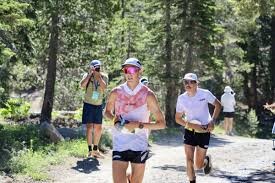
Schide’s winning time was 15:46:57, just over 17 minutes behind Courtney Dauwalter’s 2023 course record, almost an hour faster than her own time last year, and the second fastest women’s time ever. Walmsley, meanwhile, won his fourth Western States in 14:13:45, the second fastest time ever — only behind his own record of 14:09:28 that he set in 2019.
Second and third in the men’s race came down to an epic sprint finish on the track between Farvard and Hayden Hawks , who finished in 14:24:15 and 14:24:31, respectively.
In the women’s race for the podium, Fu-Zhao Xiang (pre-race interview) finished second in 16:20:03, and Eszter Csillag took third for the second time in a row, in 16:42:17.
Both races featured one of the deepest and most competitive fields in race history, with the men’s top five all coming in faster than last year’s winning time, and the women’s top 10 finishing just under 40 minutes faster than last year’s incredibly competitive top 10.
At 5 a.m. on Saturday, June 29, they were all among the 375 runners who began the historic route from Olympic Valley to Auburn, California, traversing 100.2 miles of trail with 18,000 feet of elevation gain and 22,000 feet of loss. After last year’s cool temperatures, the weather at this year’s race was a bit warmer, albeit with a notable lack of snow in the high country. The high temperature in Auburn was in the low 90s Fahrenheit.
A special thanks to HOKA for making our coverage of the Western States 100 possible!
Login to leave a comment
Walmsley and Schide favorites as Western States line-ups are finalized
Americans Jim Walmsley and Katie Schide, both UTMB winners, will head the finalized fields for the 51st edition of Western States 100 Endurance Run at the end of this month.
Western States is the oldest and arguably the most iconic 100-mile trail run in the world and the stars are again out in force Auburn on June 29-30.
Can Walmsley make it four?
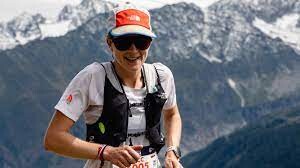
Last year Walmsley memorably ended his quest to finally add a UTMB title in Chamonix to his CV and he’s the current course record holder at Western States, which he’s already won three times.
His time of 14:09:28 from 2019 hasn’t been bettered since and he’s the highest-ranked runner in terms of the UTMB index at 934 (Kilian Jornet is top on 941).
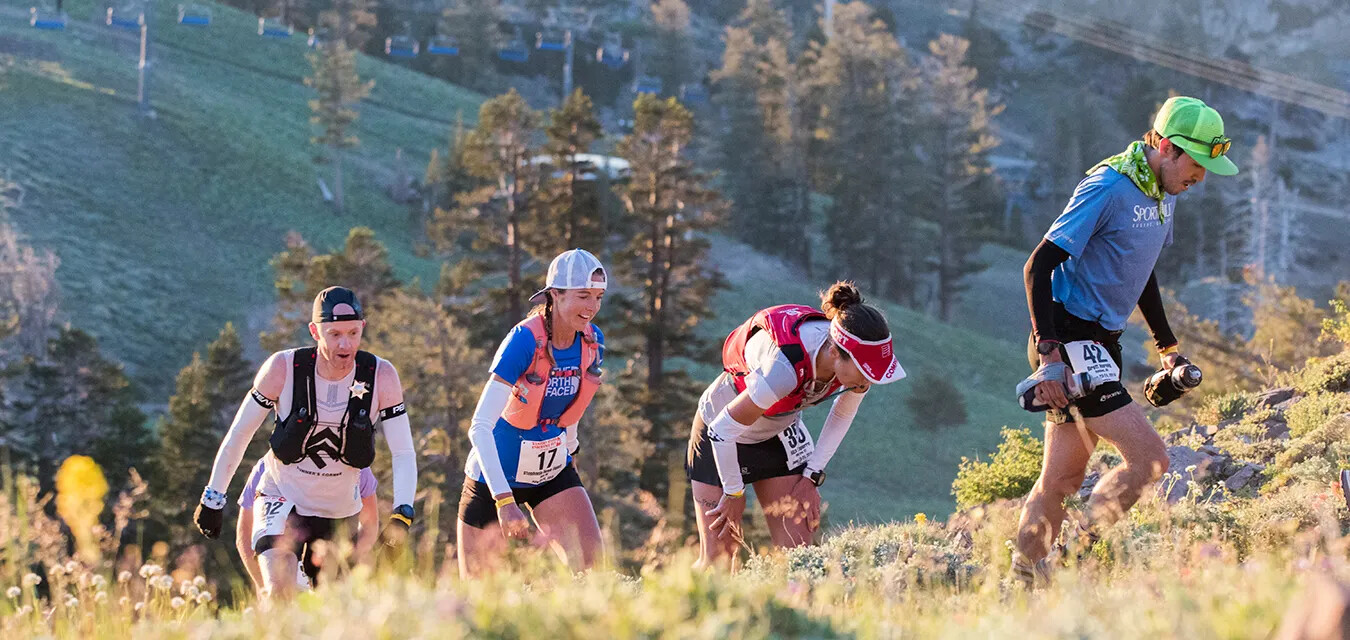
But he’ll face a raft of strong rivals including the 2023 runner-up Tyler Green (USA, UTMB Index 880) and several other top finishers from 2023, including fourth-placed Jiasheng Shen (CHN, UTMB Index 906).
Dakota Jones (USA, UTMB Index 902), Ji Duo (CHN, UTMB Index 889) and Hayden Hawks (USA, UTMB Index 910) booked their spots alongside Walmsley via Golden Tickets from top-three performances at other big events.
Schide the one to beat
And on the women’s side the 2022 UTMB winner Katie Schide (UTMB Index 825) will be looking to go one better than last year’s second place at Western States.
Only superstar Courtney Dauwalter on 847 is ahead of Schide on the UTMB Index but the reigning Western States champion (who smashed the course record time when beating Schide) won’t be back to defend her title.
That means that Schide, who underlined her form with victory at the Canyons Endurance Runs by UTMB at the end of April, starts as the clear favourite.
But she too will face tough opposition from the likes of Eszter Csillag (HUN, UTMB Index 768), who finished third 12 months ago, and three-time finisher Emily Hawgood (ZWE, UTMB Index 757).
Other big names lining up include former professional IRONMAN athlete Heather Jackson (USA, UTMB Index 764), Eleanor Davis (GBR, UTMB Index 753) and Emily Schmitz (USA, UTMB Index 736).
Jackson recently advertised her gravel racing prowess in a thrilling sprint finish at the famed Unbound event.
We’ll build up to the big event over the next couple of weeks here at RUN247.
by Jonathan Turner
Login to leave a comment
Western States 100
The Western States ® 100-Mile Endurance Run is the world’s oldest and most prestigious 100-mile trail race. Starting in Squaw Valley, California near the site of the 1960 Winter Olympics and ending 100.2 miles later in Auburn, California, Western States, in the decades since its inception in 1974, has come to represent one of the ultimate endurance tests in the...
more...Jim Walmsley, Mathieu Blanchard will return to UTMB in 2024
2023 UTMB champion Jim Walmsley and 2022 second-place finisher Mathieu Blanchard have confirmed they will appear at this year’s Ultra-Trail du Mont-Blanc (UTMB) final, which takes place in Chamonix, France on Aug. 30, according to a report by iRunFar. A number of other ultratrail elites have also been announced, including the U.K.’s Tom Evans, who finished third in 2022 and who won Western States 100 in 2023, and Canada’s Christian Meier, the former pro cyclist who won the 145-km TDS race last year.
On the women’s side, Canada’s Marianne Hogan (who finished second in 2022) is confirmed, as are 2022 champion Katie Schide of the U.S., France’s Claire Bannwarth and New Zealand’s Ruth Croft (who won Western States in 2022). (Three-time UTMB champion and course record holder Courtney Dauwalter does not appear on the list.)
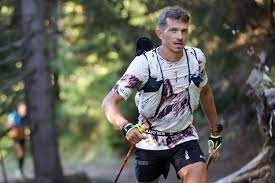
Four-time champion Kilian Jornet and 2023 second-place finisher Zach Miller will also not be returning. After the October, 2023 announcement by UTMB and its minority partner, the Ironman Group, of a new race in Whistler, B.C. in 2024, and the Dec. 1 announcement that UTMB livestream announcer Corrine Malcolm had been fired, the two publicly questioned the organization’s decisions and its treatment of athletes. There was talk of a boycott, though Jornet and Miller dispute this; in the wake of all of this, regular discussions between UTMB and the Pro Trail Runners Association (PTRA), of which Jornet is a founding member, became more frequent, with a view to smoothing relations between athletes and the race.
Walmsley moved to France for two years to hone his mountain-running skills before finally winning UTMB on his fifth try in 2023 (he Walmsley first ran UTMB in 2017, finishing fifth; he DNF’d in 2018 and again in 2021, then finished fourth in 2022). Blanchard, who has returned to France after living in Montreal for a few years (and taking out Canadian citizenship), finished fourth last year after following Jornet onto the podium in 2022. Hogan has been dealing with injuries for much of the last year and a half since her podium finish in 2022.
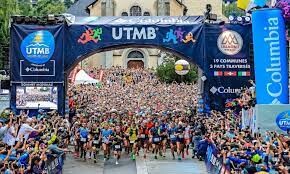
by Anne Francis
Login to leave a comment
North Face Ultra Trail du Tour du Mont-Blanc
Mountain race, with numerous passages in high altitude (>2500m), in difficult weather conditions (night, wind, cold, rain or snow), that needs a very good training, adapted equipment and a real capacity of personal autonomy. It is 6:00pm and we are more or less 2300 people sharing the same dream carefully prepared over many months. Despite the incredible difficulty, we feel...
more...Courtney Dauwalter breaks record at Western States 100 by almost 80 minutes
Ultramarathon runner Courtney Dauwalter crushed the women’s course record at the Western States 100-mile race in California, taking more than an hour off the previous best time.
Dauwalter finished the Western States 100 – the world’s oldest 100-mile race – in 15 hours, 29 minutes and 34 seconds, almost 80 minutes faster than Ellie Greenwood’s record set in 2012. The race was first run in 1974.
“I just kept asking [my legs] to do one more mile for me and they kept responding, so I was very thankful for that,” Dauwalter told iRunFar about the last 20 miles of the race.
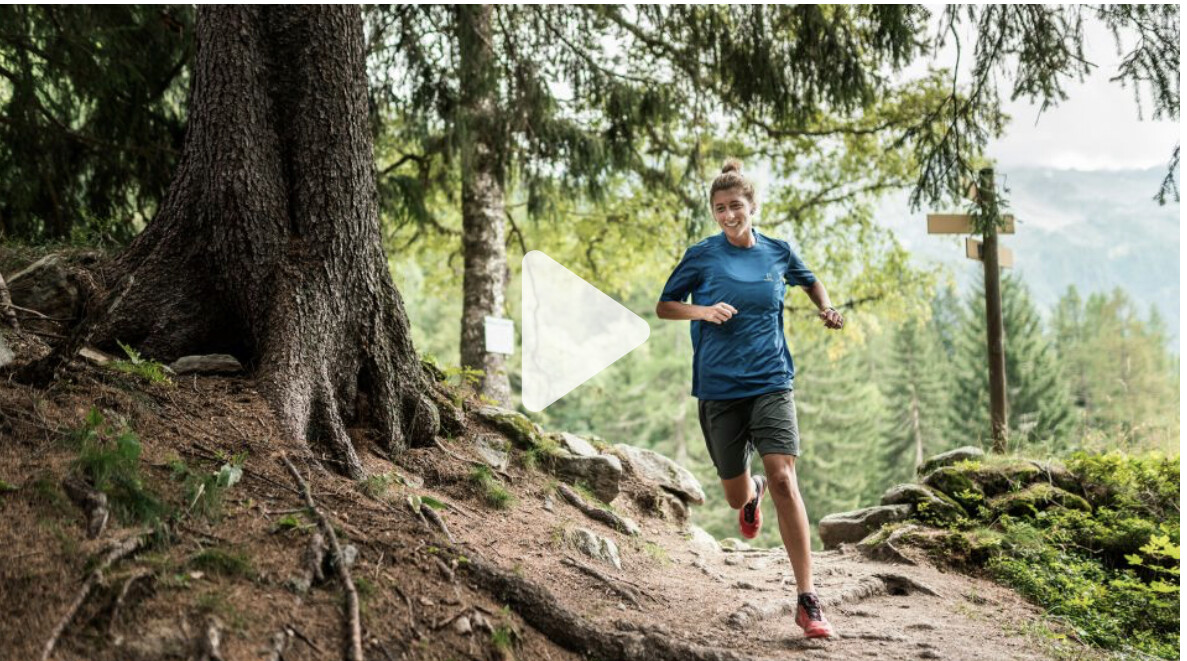
“I was definitely, though, deep in the pain cave and really focused on every single step, every single second.”
Cooler weather contributed to faster times at this year’s Western States 100, which started in the early hours of Saturday morning in Olympic Valley, California.
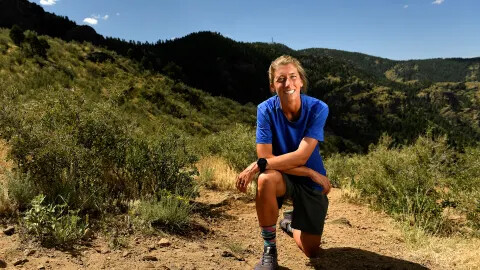
Snow covered much of the initial stages of the course before runners descended into a recently unshaded section scorched by last year’s Mosquito Fire.
After running with fellow American Katie Schide, Dauwalter started pulling away around the 30-mile mark, steadily eating away at Greenwood’s course record.
Covering 18,000 feet of climbing and almost 23,000 feet of descent across Californian trails, the race finishes on a high school running track in the city of Auburn in Placer County.
“I couldn’t believe when the track suddenly showed up and you make that turn, I was like: We did it! We’re here!” Dauwalter told iRunFar.
“Because that was the moment where I let myself actually believe that we had finished and we were about to be able to stop moving.”
Dauwalter, who is set to defend her title at the Hardrock 100 in Colorado in three weeks’ time, also won the Western States 100 in 2018, though her time this year was nearly two hours faster.
Most people’s idea of fun wouldn’t involve running for hours on end through brutal, undulating terrain – but ultra-marathon sensation Courtney Dauwalter is no ordinary person.
While an ultra-marathon is technically defined as any race longer than 26.2 miles, Dauwalter’s exploits tend to take place at distances far greater than that, usually between 100 to 250 miles.
The 38-year-old’s list of achievements is almost interminable. Dauwalter, a four-time ‘Ultra Running Magazine Ultrarunner of the year,’ holds multiple course records for the obscenely long races around the US and abroad.
Dauwalter’s breakout moment came at the Moab 240 – an annual 240-mile race in Utah. At the 2017 edition, shortly after making the decision to become a full-time ultra-runner, Dauwalter completed the course a scarcely believable 10 hours ahead of all other competitors – male and female.
The Transgrancanaria event on February 24 – Dauwalter’s most recent escapade - resulted in her 15th straight race win by gender dating back to March 2021, according to results database Ultrasignup.
The Minnesota native completed the grueling 128km course (79.5 miles) – including over 7000 meters of elevation gain - around the Canary Island in a course record 14 hours 40 minutes: over 90 minutes ahead of her closest competitor.
Login to leave a comment
2023 Western States 100 Women’s Race
None of the first four women from last year’s race — Ruth Croft, Ailsa MacDonald, Marianne Hogan, Luzia Buehler — returned. That made Zimbabwe’s Emily Hawgood (pre-race interview) the highest returning finisher from 2022. Hawgood’s pretty much a race local now too, living in nearby Roseville, California. But it was 38-year-old Courtney Dauwalter (pre-race interview) that came into the race as a favorite. She won here in 2018 in 17:27 and was looking to avenge a late drop at the 2019 race.
Dauwalter was first up the Escarpment. At 2,500 feet, it’s the race’s biggest climb and it happens right away in the first three miles. But 2022 UTMB winner Katie Schide (pre-race interview) was right there too. Schide, an American who’s lived in France for the past seven years, hit the top in 46 minutes with Dauwalter and the two dropped into the Granite Chief Wilderness together. Already Dauwalter and Schide, age 31, had a three-minute lead on third-place Ida Nilsson (pre-race interview) from Sweden.
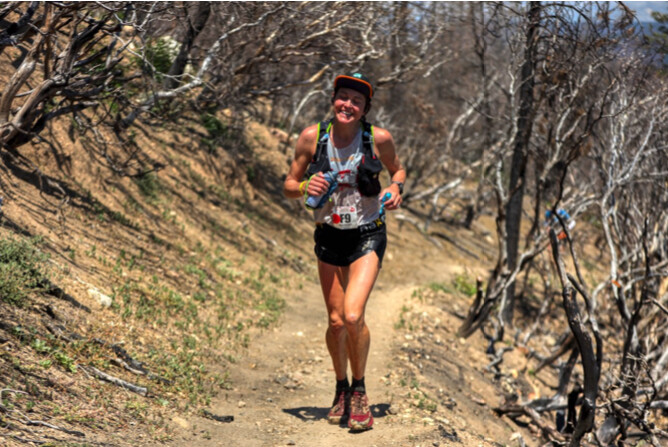
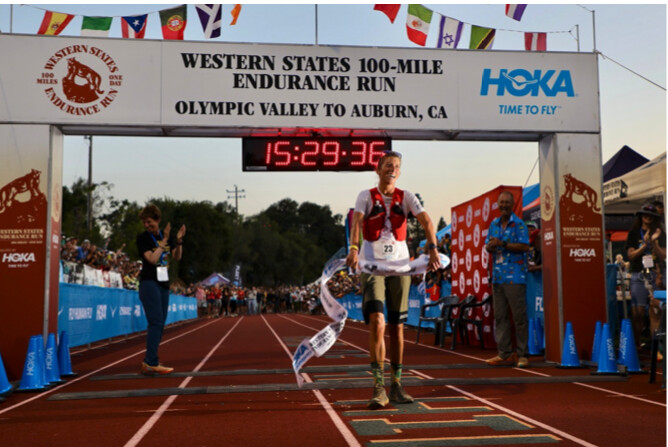
By mile 11, Lyon Ridge, Dauwalter and Schide’s lead on third-place Nilsson had ballooned to eight minutes. And then it got even bigger as the two completely broke away from everyone else. At mile 16, Red Star Ridge, no one was within 14 minutes of the front two. Nilsson, Hawgood, 2023 Black Canyon 100k winner Keely Henninger (pre-race interview), Taylor Nowlin, professional triathlete-turned-ultrarunner Heather Jackson, Canada’s Priscilla Forgie and Jenny Quilty, and 2022 sixth-place finisher Leah Yingling (pre-race interview) all ran inside the early top 10.
The Mosquito Fire limited crew access this year and everyone met their crews for the first time at mile 30, Robinson Flat. Dauwalter was in at 5:07 and out within a minute, and still on her 2019 splits. Schide took a longer break and changed shoes, exiting the aid station three minutes behind the leader. The two had completely broken open the women’s race. Nilsson, in her 100-mile debut, had been alone in third to this point, but was now joined by Henninger, Hawgood, and Nowlin.
At mile 34, Miller’s Defeat, the course record watch started. Dauwalter and Schide were under Dauwalter’s own 2019 splits and Ellie Greenwood’s 2012 course record pace. Dauwalter was five minutes up on Greenwood’s splits, and Schide was three minutes faster. Even more, the two were over 30 minutes in front of third-place Hawgood at mile 38. Dauwalter and Schide were out front for the win and the course record, and the other contenders grouped behind them.
Dauwalter was red hot up the Devil’s Thumb climb at mile 48, but Schide hadn’t given up much time. She took longer in aid and left six minutes after Dauwalter. Hawgood, Nowlin, and Henninger came in together next, now 40 minutes behind second-place Schide.
At Foresthill, Dauwalter was 25 minutes up on record pace. Schide conceded only another two minutes over the last stretch and was 11 minutes behind Dauwalter. While Dauwalter and Schide were still off the front, the race dynamic was heating up behind. The third- through eighth-place women were all in Foresthill together with only three minutes separation. Hawgood was there first among the chase group, but Hungarian living in Hong Kong Eszter Csillag quickly jumped from eighth at mile 52 to fourth at mile 62. Nilsson was fifth, and Henninger, Katie Asmuth, and Nowlin were all there too.
Dauwalter ran 2:10 from mile 62 Foresthill to mile 78 at the American River. Only the men’s winner would run a quicker split on this day, and only eight men have ever run a faster split in the race. Dauwalter was five levels better than everyone else, and she was boldly racing without a pacer too. Schide stayed comfortably in second, but fell further behind Dauwalter’s quickening pace and river conditions necessitated that everyone cross the American River in a boat this year.
From Foresthill to the river, Katie Asmuth vaulted into third, past Eszter Csillag and Ida Nilsson. Asmuth was seventh at Foresthill and picked up four spots on the downhill Cal Street stretch, outrunning common expectations in coming back from injury. All three women split faster from Foresthill to the river than Schide did and even if the front two were gone, the women in general were running really fast. There’s bound to be some bad luck in a 100 miler though, and Henninger fell just before the river and dislocated her shoulder. She would then drop from the race at mile 80, Green Gate, due to that injury.
Dauwalter’s incredible second half and incredible race brought her to the Placer High School track finish in 15:29. Dauwalter completely shattered the record books and set a new standard that is likely to last for a lifetime. Ellie Greenwood’s 16:47 course record had stood since 2012. Dauwalter will next race the high altitude 2023 Hardrock 100 in Silverton, Colorado, on July 14. Dauwalter is the Hardrock course record holder, too, but Western States plus Hardrock will certainly be a challenging double.
Schide challenged Dauwalter early, and outpaced the rest of the women’s field in doing so. Schide was in second for much of the day, ultimately finishing as runner up in 16:43. That was also under the old course record.
Csillag, who was fifth at the 2022 UTMB, had a remarkable second half to finish third in 17:09. It is the race’s fourth-fastest run ever. And she just edged out Asmuth, who moved up from last year’s ninth-place run to finish fourth in 17:21. Asmuth’s time was just inside of Ruth Croft’s winning time from last year, and is the race’s fifth-fastest ever.
Hawgood earned a second straight fifth-place finish. In 2022 she was able to finish fifth in 18:16 and in this year’s faster race Hawgood was fifth in 17:26. That time ranks eighth-best ever and is just faster than what Dauwalter ran to win in 2018.
Taylor Nowlin improved her finish place by one from prior year, but like Hawgood greatly improved her finish time. Nowlin was sixth in 17:40. One-hundred-mile debutante Ida Nilsson was seventh in 17:43, and Priscilla Forgie was just minutes back in eighth at 17:46. Leah Yingling was a repeat top-10 finisher in ninth at 17:49. For perspective, no year had seen more than three women finish under 18 hours before. But this year nine women finished under 18 hours. It is the new standard for women’s racing at Western States.
The 25-year-old Meghan Morgan took the prized 10th-place finish in 18:11, thereby guaranteeing a chance to automatically return next year.
by Justin Mock I Run Far
Login to leave a comment
Western States 100
The Western States ® 100-Mile Endurance Run is the world’s oldest and most prestigious 100-mile trail race. Starting in Squaw Valley, California near the site of the 1960 Winter Olympics and ending 100.2 miles later in Auburn, California, Western States, in the decades since its inception in 1974, has come to represent one of the ultimate endurance tests in the...
more...2022 UTMB Women’s Race
An American living in France and eighth-place finisher at UTMB in 2021, Katie Schide set out to make her mark on the race from the beginning, leading the women’s field after seven kilometers into Les Houches while being trailed closely by the trio of Marianne Hogan from Canada, Kaytlyn Gerbinfrom the USA, and Hillary Allen from the USA.
Schide grew the gap over the next 13 kilometers into Saint-Gervais. With only one hour and 48 minutes on the race clock, a truly raw opening effort, her lead over second place Hogan was already five minutes, and she had eight minutes on third place Audrey Tanguy (pre-race interview) of France. Jocelyne Pauly and Manon Bohard, both from France also, came through in fourth and fifth with Mimmi Kotka (pre-race interview), a Swede living in Chamonix, just behind them in sixth.
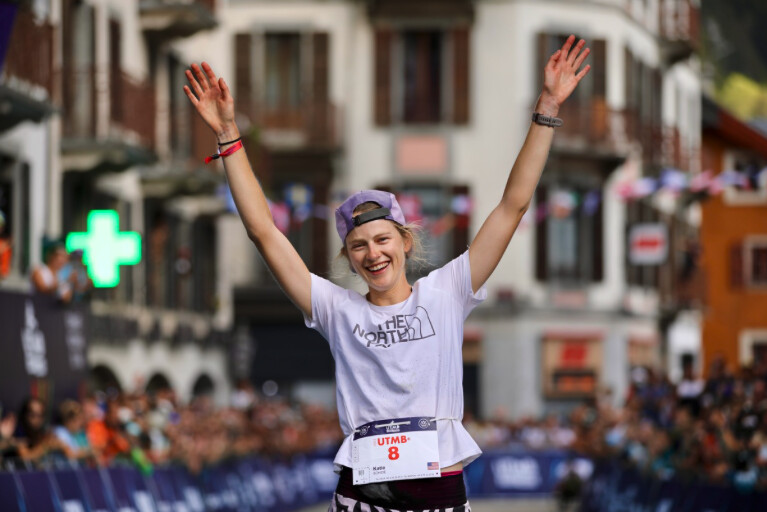
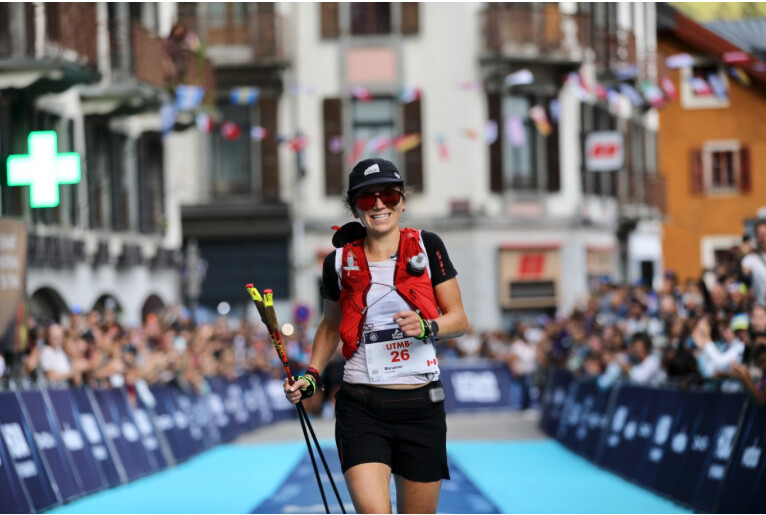
Fu-Zhao Xiang (pre-race interview) of China, Ragna Debats (pre-race interview), who is Dutch but lives in Spain, and Azara García (pre-race interview) of Spain rounded out the top 10, running together 13 minutes behind Schide.Keeping up her consistent and strong pace, Schide continued to increase her lead on the rest of the women’s field, coming into Les Contamines at 31 kilometers with 2:50 on the race clock.
By then, she’d extended her lead on Hogan to over nine minutes, Tanguy to 12 minutes, and Bohard and Pauly to 15 minutes. Tanguy was probably relieved to make it past Les Contamines where she had dropped last year from severe stomach cramps. A visibility limping Kotka, who had challenged Courtney Dauwalter during last year’s UTMB during the early miles of the race before finishing third as Dauwalter won, came into Les Contamines nearly 20 minutes off the lead in sixth and would not continue.
Schide continued to smile coming through the Col du Bonhomme, at about a marathon’s distance into the race, clearly enjoying her run through the night and appreciating the cheers of the spectators. Climbing one of the largest passes of the race only seemed to make her stronger. Her gap to Hogan and Tanguy had grown to about 20 minutes as the two chasers crested the col.
The cheers from the enthusiastic French crowd brought smiles to both women’s faces as they passed through. The cheers continued for Bohard and Pauly, who were still running together.
The crowd at Les Chapieux, 50 kilometers in, was enthused to see Schide, erupting in huge cheers as she came in. While the gaps between the women in second through 10th grew and shrunk over the kilometers, Schide’s gap on the field had only gone one direction so far: up. She was now more than 22 minutes up on second place Hogan. By the time Schide got to Lac Combal, 66 kilometers into the race, the gap was up to 25 minutes, and it would be an additional 20 minutes for Tanguy to arrive after that.With 80 kilometers run, Schide came into Courmayeur flying, spending only eight minutes at the aid station approximately halfway into the race.
The crowds were thrilled to see her, providing a warm and raucous welcome as she ran into the aid station looking smooth. But for the first time in the race thus far, Hogan had started to close the gap to the leader, whittling it down to just over 20 minutes. Smiling but with a stomach that couldn’t handle gels any more, she quickly drank a Coke and opted for pizza for fuel. The gap between the top two women and the rest of the field continued to grow, and it was over an hour before Tanguy, Pauly, and Gerbin ran through, and a few more minutes after them to the sixth woman, Emily Hawgood, of Zimbabwe, who lives in the USA.
While Schide had seemed unstoppable before Courmayeur, the tables seemed to turn over the next 17 kilometers to Arnouvaz as night turned to day. Schide came in with stomach issues, clearly in a rough spot, with Hogan hot on her heels, now only two minutes behind. Closing a gap of more than 18 minutes is a feat to be acknowledged, and a feisty and strong Hogan seemed energized by the coming of the day and the idea of leading the race for the first time.
A struggling Schide maintained her lead over the Grand Col Ferret at 102 kilometers, but it was down to a minute, and when the women’s leader arrived at La Fouly at 112 kilometers, it was Hogan instead of Schide for the first time, with a sizable six-minute gap.
By Champex-Lac at 125 kilometers, it was still Hogan in the lead and well under course record pace, now with a 10-minute gap to second. But Schide wasn’t about to give up, slowing down to let her stomach recover from its previous rough spell, and finally eating a cheese sandwich and starting to move well again.
One hundred miles is a long distance to race, long enough that runners can get through rough spells and rebound. And that’s exactly what Schide did, regaining the lead in Trient at kilometer 142, not only eliminating the 10-minute gap but putting an additional 10 minutes on Hogan. By Vallorcine at 153 kilometers, the gap between the top two was up to 41 minutes, with Hogan nursing a hurt left leg.
By the time the pair reached the finish line in Chamonix, they maintained their one-two position with Schide having extended the gap to some 75 minutes.It was another 35 minutes later that we saw the final member of the women’s podium arrive, Gerbin, who ran for much of the second half of the race in what she described as “no woman’s land,” well in front of those behind her but out of contact with the lead.
It was apparently a comfortable spot for her, though, as she held her position strongly, and crossed the finish line back in Chamonix like she could run plenty more kilometers if needed.
Pauly finished fourth, the successful conclusion of a focused day of racing. Eszter Csillag, who is from Hungary but lives in Hong Kong, moved up later on to take fifth. Emily Hawgood ran strong all day to set and maintain a very similar position of sixth place. Xiang held tight to seventh place with Spain’s Aroa Sio just behind in eighth. Italy’s Francesca Pretto and Eva-Maria Sperger of Germany moved up into the top 10 in the last 50 kilometers.
Login to leave a comment
UTMB Is Back!
The world's most important trail race is driving forward-pandemic or not-and despite a tough year across the board, it seems to only be gaining steam.
While many races struggle to fill their 2021 entry slots, that was not a problem for UTMB, Chamonix, France's Ultra-Trail du Mont-Blanc-now six races from 40 to 300 kilometers, all of which take place during the final week of August in the legendary mountain town at the base of Mont Blanc. Despite a year off due to the global pandemic, interest in the race series remains very strong.
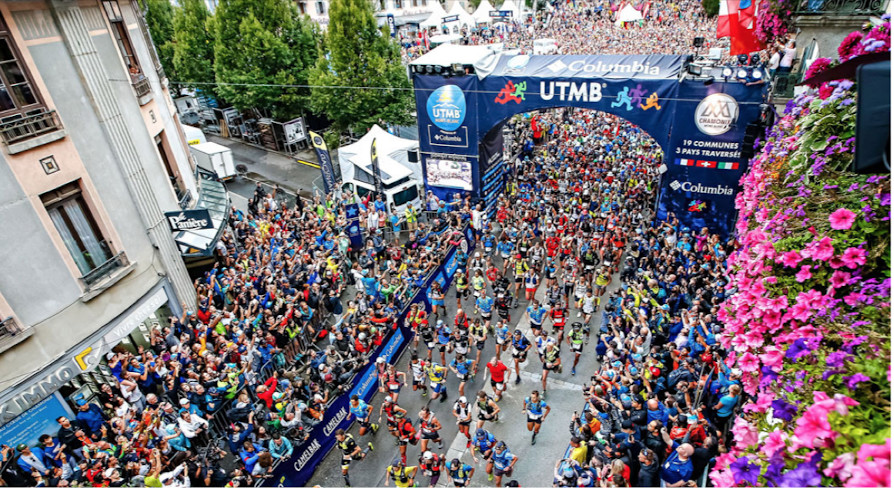
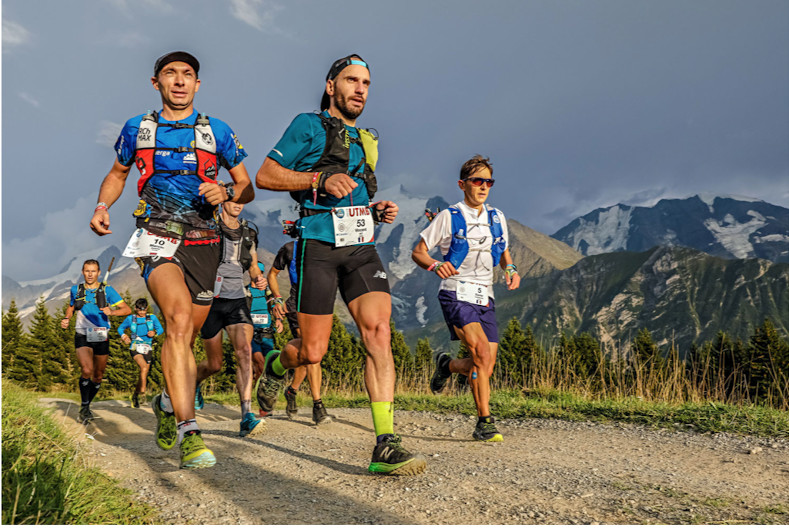
For the 16th time in a row, the UTMB races have sold out, with 10,000 runners slated across all the races. With the pandemic continuing to complicate international travel, the event's mix of nationalities has shifted, with more participants from within Europe and fewer from China and Japan. Despite the long-haul travel involved, U.S. interest in UTMB continues to grow, up slightly to 338 participants.
The UTMB organization is contemplating a number of changes this year, including a streamlined bib pickup system and wave starts with a few hundred runners in each block. Runners will have to wash their hands on their way into aid stations, with social distancing and masks being de rigeur. Shared food bins will be a thing of the past, and it's possible runner assistance areas may be altered or eliminated.
Despite the global uncertainty, 2021's marquee race around 15,774-foot high Mont Blanc looks to be among the most competitive trail races ever, on a par with 2017, which some observers have considered the most stacked trail race in the history of the sport. That year, France's Francois D'Haene edged out Catalonia's Kilian Jornet by 15 minutes, and Spain's Nria Picas won in a down-to-the-wire race, edging out Switzerland's Andrea Huser by under three minutes.
How did such a strong field coalesce? "It was really just organic. We didn't do anything specific to make it happen," says UTMB's Press Officer, Hugo Joyeux. One example is a post by three-time UTMB winner D'Haene, who asked on Instagram, "Who's coming back to take part in the party? I'll be there!" D'Haene went on to tag his top challengers, gently teasing them into showing up at the starting line next to the Mayor's office in the old part of Chamonix this August 27th. Most are in, with Jornet notably absent as he continues to reduce his trail-racing schedule to focus on mountaineering objectives.
The USA's top runners didn't need a social media ribbing from D'Haene to add the race to their calendars. Starting for the women will be Courtney Dauwalter, aiming for a second consecutive UTMB win, along with Katie Schide, Kaytlyn Gerbin, Brittany Peterson and Stephanie Howe. Schide, second in the CCC race in 2018, and 6th in the UTMB in 2019, currently lives in the south of France, in the maritime Alps region, and is easily the most experienced European racer among the U.S. women's elite entrants.
"UTMB reliably draws the most competitive field of the year," says Schide. With top runners coming out of an usual pandemic year-plus, Schide is eager to go head-to-head. "Time trials and personal challenges are fun, but racing is where I'm really able to find the absolute limits."
The U.S. men's delegation is equally competitive-with a dose of angst added, too. In 18 years, no American male has ever won UTMB. It's long since started to be a topic of discussion. Flagstaff, Arizona's Jim Walmsley has started UTMB twice, finishing fifth in 2017 and dropping out in 2019, while Tim Tollefson, from Mammoth Lakes, California, has had four starts, with two third-place finishes. In 2018, he took a serious fall, fileting a quadricep-yet he still managed to run another 90 kilometers before having to drop. The wound ended up requiring eight stitches. The following year, he showed up at the starting line feeling ill, and eventually dropped.
About 2021, Tollefson says, "It's going to be another barn burner," revealing that comparisons with others toeing the start line has been something with which he has struggled over the years. "Contrary to what most may believe, anxiety over who is or isn't in a field has tormented me historically," he explains. "Insecurities over training, fraudulent thoughts of belonging, self punishment and disrupted sleep were commonplace."
For Tollefson, that mix of emotions has added up to sleepless nights and high levels of stress. This past year, counseling has offered him a better perspective. In addition to the usual training, he's working on "becoming mindful in life and believing that the quest to become the best version of myself-which is not dependent on the love, acceptance or applause of anyone else-is the ultramarathon worth mastering."
"I left the Chamonix valley in 2018 full of anger, guilt and shame. What brewed over the next 12 months was a toxic cocktail of unchecked emotions and coping strategies," says Tollefson. "No matter how much I lied to myself and others, I simply did not want to be there."
How will he feel, arriving in Chamonix valley this August? "For the first time in years, the thought of being back in the valley, truly present, is beginning to excite me."
The restart of UTMB this summer is welcome news to this Alps tourist hub, which historically welcomes close to 100,000 guests for the race series at the close of each August. When last August's races were cancelled, the organization refunded 55 percent of the entrance fees for the 10,000 registered runners. The split created grumblings on social-media platforms. Meanwhile, the staff of 30, which includes UTMB's international races, suffered its own share of disruptions. They began working from home starting with the first French lockdown on March 17th, and didn't return to the office until this past December. They now operate with 50 percent of the staff in the office-masks required.
by Trail Runner Magazine
Login to leave a comment
Tollefson, Dauwalter Lead a Strong Pack of Americans at 2019 UTMB
A year after a bad fall ended Tim Tollefson’s latest effort to be the first American atop the podium at the Ultra-Trail du Mont-Blanc (UTMB), the ultrarunner is returning with reignited determination—but also a heavy heart.
Twice a third-place finisher of the daunting 171K, the Mammoth Lakes, California, pro is primed and ready to compete in this epic race through the French, Italian, and Swiss Alps between Friday and Saturday. This comes after Tollefson’s bid in 2018 ended around the 48K mark when a fall required stitches in his left quad, forcing him to withdraw, but not leading to any long-term damage.
Though a disappointing way to end his day and his hunt for first, he’s put that behind him as he once again tries to become the first American man to finish atop the podium in the 17-year history of the race.
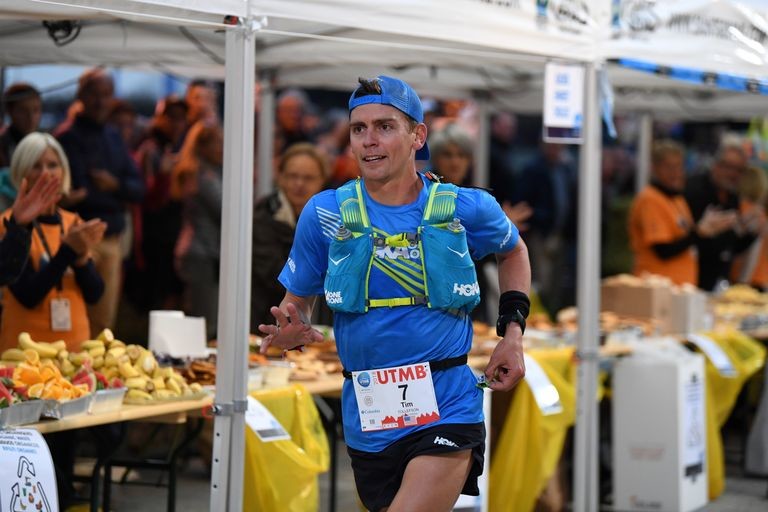
“Last year doesn’t haunt me, but it’s something I would like to avenge,” Tollefson told Runner’s World. “It serves more of a constant reminder that I need to come back here and prove something to myself because I think I have unfinished business. I think this race in particular plays to experience, and I’d like to think that I now have enough experience and the skill set to put together the performance I have dreamt of.”
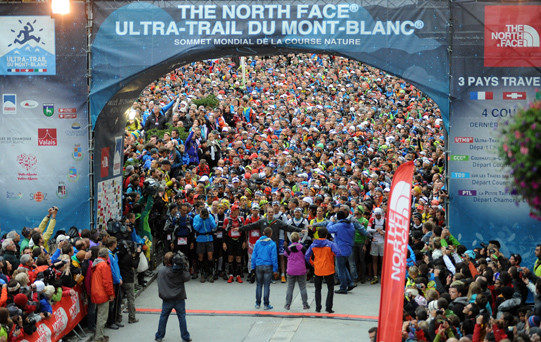
Training was slightly different this year to prepare. The 34-year-old physical therapist added about 20 percent more vertical gain during his weekly training, especially on long runs. This included dozens of 20- to 30-mile runs with about 9,500 feet of vertical gain. He also won the popular 120K Lavaredo Ultra Trail in June in Cortina, Italy, with a time of 12:18:47.
With more than 32,000 feet of vertical gain and often inclement weather, the UTMB course has been known to crush even the strongest and fittest runners. Tollefson proved worthy of the challenge in 2016 and 2017 with third-place efforts, not to mention his runner-up showing in the adjacent CCC 100K in 2015.
This year, Tollefson is competing for more than just his personal goals: He is running to honor a fallen friend. On August 14, friend and fellow Mammoth Lakes resident Cody Tuttle, a 32-year-old professional filmmaker and photographer who documented Tollefson for several projects, died in a paragliding accident near Lone Pine, California.
“It was a tragic loss for the community,” Tollefson said. “It’s a sobering reminder that every time we go into the mountains, there is an inherent risk, and yet there is a reason we are all drawn to this type of rugged mountain environment.”
Tollefson will have heavy competition as he strives for his goal. As usual, the men’s field of the race is deep, with Frenchman Xavier Thévenard, a three-time winner and defending champion as the clear favorite. Last year’s runner-up Robert Hajnal of Romania is also in the field, but Americans Zach Miller, twice a top-10 finisher at UTMB, Alex Nichols, who was second at the 2018 Hong Kong 100K, Hayden Hawks, who has had big success at 50K and 100K races, and Jason Schlarb, who has been on a tear since turning 40, could all be contenders.
“I feel like I’ve finally acquired the climbing skills that allows me to run with the Europeans and be able to be confident coming into this race,” Tollefson said. “It still comes down to executing the race, but I’m really psyched to get out there and run another lap around Mont Blanc.”
The women’s field is also intriguing, especially from an American point of view. Although defending champion Francesca Canepa of Italy returns, all eyes are on Courtney Dauwalter, who has dominated women’s ultrarunning in recent years, right up to the point when she dropped out of the Western States Endurance Run in late June with a hip injury. The 34-year-old Golden, Colorado, resident is healthy, but admits she didn’t do the training she had hoped while recovering from her injury.
“It’s a long race and, from what I hear, it’s a grind, so it’s not a fast 100-miler,” Dauwalter told Runner’s World. “I’m not sure how my skills and experience will play into it, but I’m going to take each section as they come and run as efficiently as possible and see what happens. These mountains are awesome and the challenge will be big.”
Two-time winner Rory Bosio (2013, 2014) from Truckee, California, is also back after running the shorter OCC in 2017 and the longer TDS last year, while Nebraska’s Kaci Licktieg, who took third at Western States Endurance Run this year, and Katie Schide, an American living in Switzerland, both could be poised to compete for podium finishes.
“I don’t know if I can be competitive; the women’s field is bonkers this year, and I think that’s great,” Bosio told Runner’s World. “Winning those races back to back seems so long ago, almost like it happened to a different person. But it’s going to be an exciting race, no matter what because it’s UTMB.”
More than 2,300 runners from 90 countries will start the race at noon ET on Friday. You can follow along live here.
by Runner’s World
Login to leave a comment
North Face Ultra Trail du Tour du Mont-Blanc
Mountain race, with numerous passages in high altitude (>2500m), in difficult weather conditions (night, wind, cold, rain or snow), that needs a very good training, adapted equipment and a real capacity of personal autonomy. It is 6:00pm and we are more or less 2300 people sharing the same dream carefully prepared over many months. Despite the incredible difficulty, we feel...
more...

